‘Foster harmony, love, and an atmosphere of mutual trust’
National amila of Jamaat-e-Ahmadiyya Japan meets Huzoor
Hadith-e-Rasul – Sayings of the Holy Prophet Muhammadsa
Hazrat Abu Musara narrated, “The Prophetsa said, ‘I saw in a dream that I had emigrated from Mecca to a land that has date palm trees. At the time it occurred to me that it is either the land of Yamamah or the land of Hajar, but it has turned out to be Medina, that is Yathrib.’” (Sahih al-Bukhari, Kitab manaqibi l-ansar, Bab hijrati n-nabiyyisa wa ’ashabihi ila l-madinah)
His Own Words
Al-Baqiyat As-Salihat: Enduring good works
“Unless the desire for offspring is solely rooted in the hope for them to be devout, righteous, and serve God’s religion through obedience, [such a wish] is entirely in vain and constitutes a form of transgression and sin. Instead of referring to them as ‘righteous offspring’ [al-baqiyat as-salihat], it would be more fitting to label them ‘unfortunate offspring’ [al-baqiyat assayyi’at]. Moreover, if someone claims to yearn for virtuous, God-fearing and
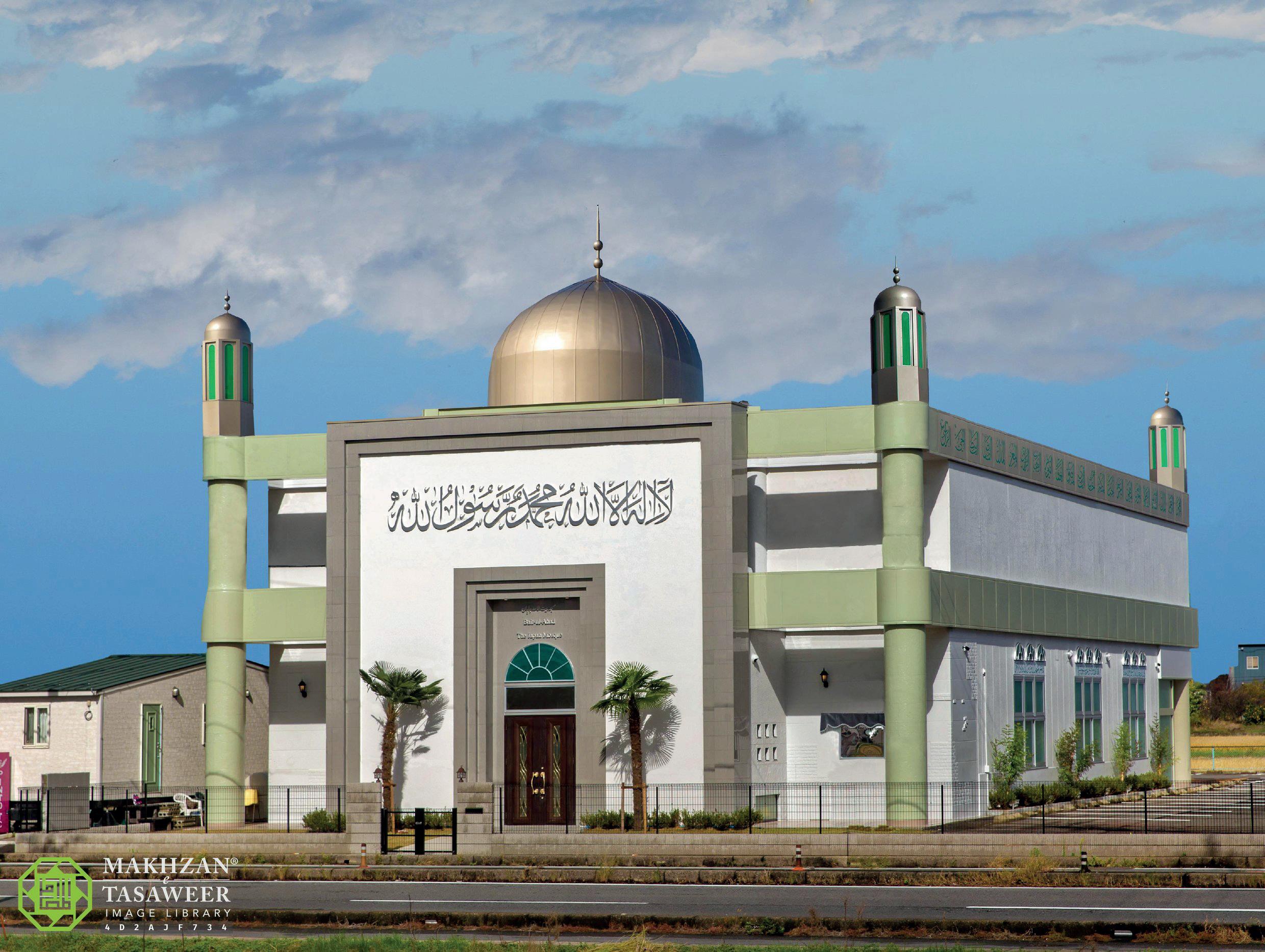
WEEKLY www.alhakam.org A
HAKAM
Page 6
12
8
to Everyday Issues Part 57
10
Continued on next page >>
Ahmadiyya Archive & Research Centre (ARC), 22 Deer Park Road, London, SW19 3TL, UK info@alhakam.org | ISSN 2754-7396 THE
AL
| Friday 30 June 2023 | Issue CCLXXVI Names of Allah: 35-46
‘Middle East in SW18’ Hazrat Musleh-e-Maud leads Eid-ul-Adha at the Fazl Mosque in London, 1955 Page
Page
Answers
Page
Hajj – A brief look at verse 197 of Surah al-Baqarah
���ا ﻰﻠﺻ ��ﻨﻟا ﻦﻋ ﻰﺳﻮﻣ ﻮﺑأ لﺎﻗ ��أ مﺎﻨﻤﻟا �� ﺖﻳأر :ﻢﻠﺳو ﻪﻴﻠ� ،ﻞ�� ﺎﻬﺑ ضرأ ﻰﻟإ ﺔﻜﻣ ﻦﻣ ﺮﺟﺎﻫأ ،ﺮﺠﻫ وأ ﺔﻣ���ﻟا ﺎﻬﻧأ ﻰﻟإ ��ﻫو ﺐﻫﺬﻓ ب��ﻳ ﺔﻨﻳﺪﻤﻟا �� اذﺈﻓ Interpreting revelation
Hazrat Mirza Ghulam Ahmadas, In
On 25 June 2023, the national amila of Ahmadiyya Muslim Jamaat Japan was blessed with the opportunity to meet Hazrat Amirul Momineen, Khalifatul Masih V, may Allah be his Helper, in a virtual mulaqat.
After conveying salaam, Huzooraa asked if this was the amila, to which Anees Nadeem Sahib, President and Missionary-in-Charge of Jamaat Japan, confirmed and further mentioned the presence of missionaries as well. Following this, Huzooraa led everyone in silent prayer, after which the members had the chance to introduce themselves.
Adnan Arshad Sahib, who is the General and Waqf-e-Nau Secretary, reported that there are two jamaats in Japan; Tokyo and Nagoya. Huzooraa enquired about the total number of Ahmadis in these jamaats, to which he responded that there are around 230. Huzooraa further asked if both jamaats are active, to which Arshad Sahib replied in the affirmative.
Ismatullah Sahib said that he is currently serving as Tabligh Secretary. Huzooraa enquired about the bai‘at target they have set for the year. Ismatullah Sahib replied that their target for the year is ten, and they have successfully achieved one bai‘at so far.
Huzooraa then asked about the background of the individual who has pledged the bai‘at, to which Ismatullah Sahib explained that the person is of Japanese descent, approximately 50 years old, and married to an Indonesian Ahmadi woman. Ismatullah Sahib also reported that they published some new leaflets, distributed 29,000 leaflets across various areas, and also distributed copies of the Holy Quran.
Huzooraa explained that, generally, people in big cities tend to prioritise worldly matters and rarely focus on having a relationship with God. Additionally, Huzooraa said, there are some individuals among the Japanese population who express their inability to adhere to the five daily prayers and the commandment to abstain from drinking. Huzooraa emphasised that prioritising preaching efforts in places
where people are more inclined towards religion and less focused on worldly matters would likely result in greater success.
Huzooraa said, “Japan is a considerably vast country; seek out the areas where your efforts can be most effective, where there is some inclination towards religion and some fear of God. Then preach to them. As for the major cities, endeavour to clear up the misconceptions about Islam that exist there.”
Huzooraa further emphasised the importance of a consistent presence in the locations where they engage in tabligh and preaching. Rather than visiting a place once and not going there again, Huzooraa suggested that they make frequent visits.
Huzooraa said that due to the fact that they are few in number, they should make a plan on how they can best utilise the few people they have for tabligh. Huzooraa added, “It is essential to generate enthusiasm and passion [for preaching] in the members.” Huzooraa said that this is also the duty of the tarbiyat department and encouraged them to make a coordinated plan.
Huzooraa emphasised, “The most crucial point is the fostering of harmony, love, and an atmosphere of trust amongst yourselves.” Huzooraa added that members of the amila, i.e., the administration, should have trust in each other, and the Jamaat members should trust the administrative team. Then, the administrative team should reciprocate that trust towards the Jamaat members. All kinds of complaints, grievances, and grudges should be resolved. Huzooraa said, “Stand united. Success invariably comes when you stand firm and united as a cemented wall. Without this unity, success is not achievable.”
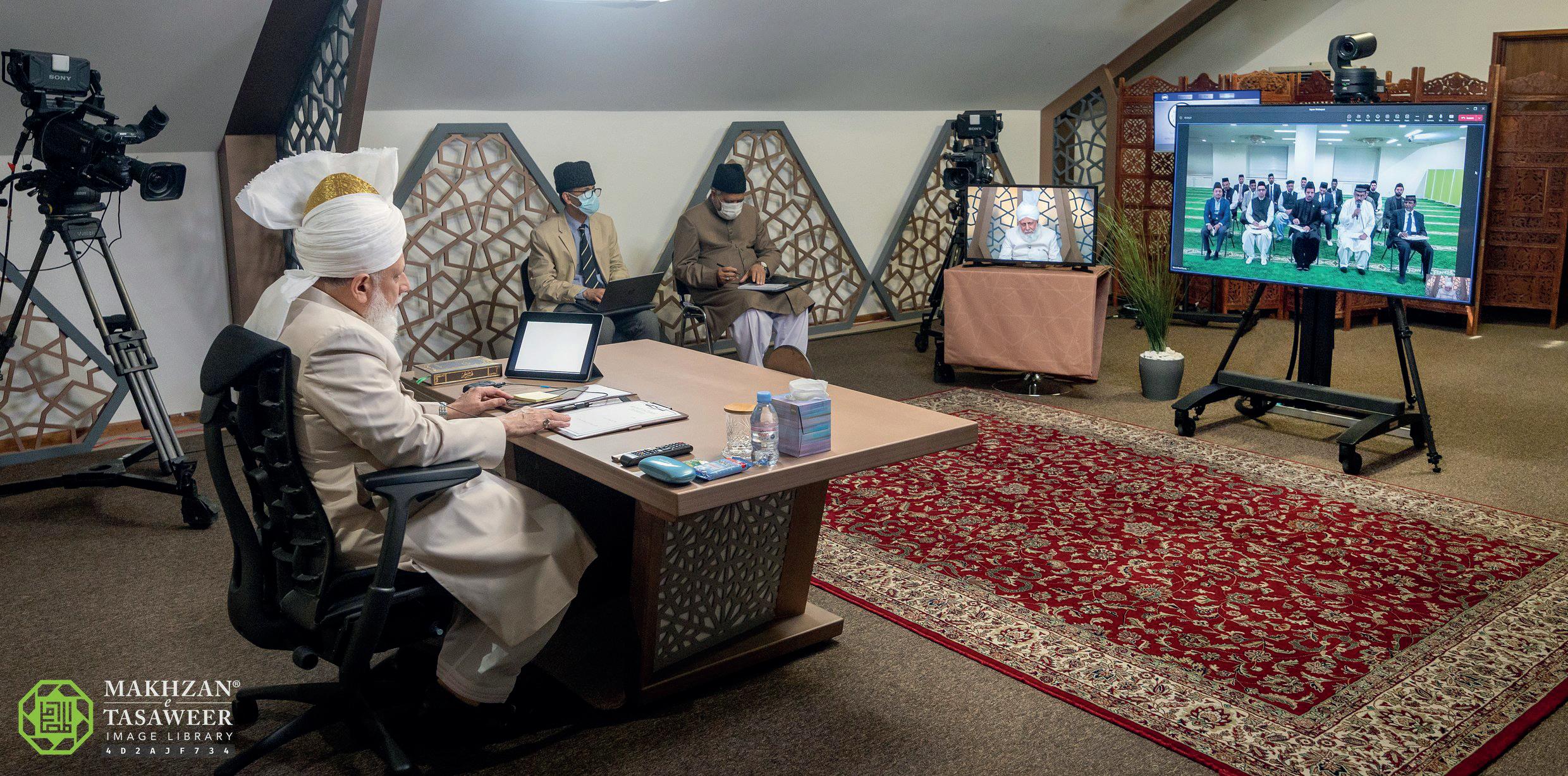
Anwar Ahmad Sahib mentioned that he is currently serving as the Sadr Majlis Ansarullah. Upon hearing this, Huzooraa enquired about Anwar Ahmad Sahib’s place of origin, to which he replied that he is from Rabwah. Huzooraa then asked whether all members are actively involved. Anwar
Ahmad Sahib reported that there are a total of 50 ansar with more than half of them being active participants.
Mubashar Zahid Sahib reported that he is serving as Secretary Tarbiyat. Upon hearing this, Huzooraa elaborated on the importance of conducting the tarbiyat of the 230 Ahmadis in a manner that ensures everyone regularly offers the five daily prayers in congregation, recites the Holy Quran, regularly listens to sermons, reads the books of the Promised Messiahas, maintains a good moral character, and establishes an atmosphere of love. Huzooraa emphasised that through the tarbiyat of these 230 individuals, they can become role models for other jamaats
Huzooraa emphasised that every Ahmadi should strive to live as a true Ahmadi. They should “awaken the spirit within themselves for which the Promised Messiah, peace be upon him, had come.” Highlighting the potential and capacity to strive for goodness, Huzooraa emphasised that a small jamaat like theirs should serve as a role model.
“It is essential to create an atmosphere of love among each other,” Huzooraa repeatedly emphasised.
Mirza Muazam Baig Sahib, serving as Sadr Majlis Khuddam-ul-Ahmadiyya, reported that there are a total of 82 khuddam and 19 atfal in Japan. Referring to an incident where North Korea fired a missile over Japan, prompting warnings for residents to take shelter, Huzooraa enquired whether they had ever gone there for tabligh, exposition, or a visit. Mirza Muazam Baig Sahib replied in the affirmative.
Huzooraa advised to keep the khuddam attached and organise events tailored to their age groups. Huzooraa stressed the importance of explaining to khuddam that they should not be solely engrossed in worldly matters but be progressing in faith and the remembrance of God.
Hizqeel Ahmad Sahib reported that he is currently serving as a missionary in Japan. Alluding to Hizqeel Ahmad Sahib’s
<< Continued from previous page
faith-serving offspring, their claim would remain mere words, until they themselves bring about a personal transformation.” (Al Hakam, 24 September 1901, Malfuzat [1988], Vol. 1, p. 560)
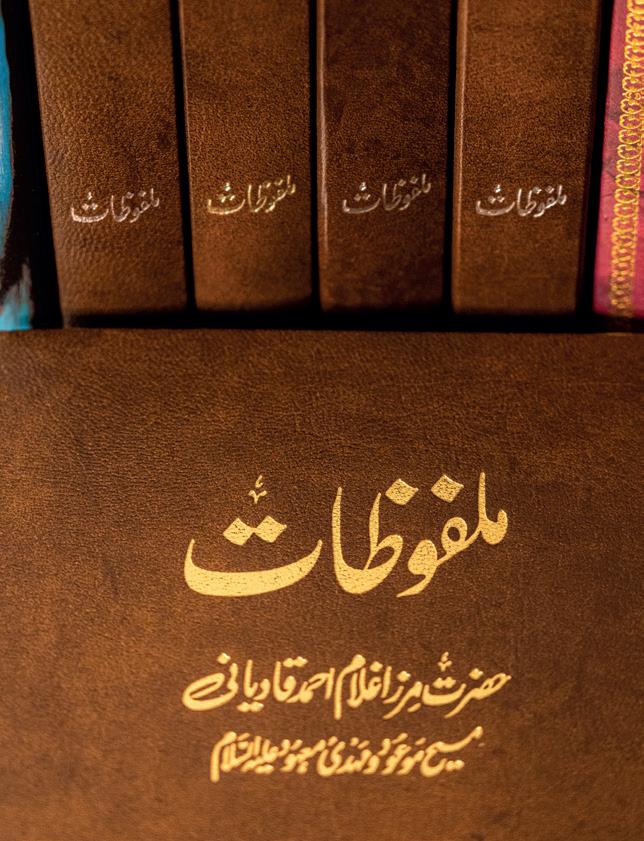
time in the UK, Huzooraa asked him if he had gained any valuable experience and whether he had implemented those lessons in Japan. Hizqeel Ahmad Sahib responded affirmatively, stating that he had indeed learned a great deal during his time in the UK, and he assured that he was making full efforts to apply those lessons in his work in Japan.
Muhammad Ibrahim Sahib reported that he was serving as a missionary and pursuing studies at Tokyo University. Huzooraa reminded him that his purpose was not solely to focus on studying at the university but also included tabligh. Huzooraa
Friday 30 June 2023 | AL HAKAM 2
Photo courtesy of Suhaib Ahmad
emphasised that he should introduce the teachings of Islam Ahmadiyyat within his university.
Hamid Amjad Arif Sahib, serving as the Secretary Umur-e-Aama, reported that his responsibilities primarily revolve around resolving disputes. Huzooraa stated that the duty of the Umur-e-Aama department goes beyond merely settling disputes. It involves making efforts for the welfare of the Jamaat’s members, assisting newcomers in finding employment, and helping them overcome the various challenges they may face. Huzooraa emphasised that settling disputes is just one aspect of their work, and the true focus should be on identifying ways to improve the Jamaat as a whole. Hamid Amjad Arif Sahib added that they have also provided assistance to individuals seeking asylum, aiding them in the process of settling in.
Farhat Rafique Sahib reported that he is serving as the Secretary Maal as well as the Secretary of Tahrik-e-Jadid and Waqfe-Jadid. Upon hearing about the multiple responsibilities assigned to him, Huzooraa remarked that it seemed he is shouldering a significant workload.
Huzooraa enquired about his place of origin in Pakistan and when he arrived in Japan. He responded that he hails from Lahore and migrated to Japan in 2018.
Regarding financial sacrifice, Huzooraa emphasised the importance of explaining it to children, highlighting that by participating in such a scheme, their money would be blessed. Huzooraa clarified that this contribution is not a tax, and neither is the Jamaat in need, nor is Allah in need of anyone’s money. Allah has stated that by engaging in financial sacrifice, there is a barakah [blessing] in one’s earnings.
During a conversation with Secretary Sami-o-Basri, Huzooraa enquired about his profession. He responded that he works with cars. Huzooraa then smiled and rhetorically asked if there is any restriction or prohibition on keeping a beard when working with cars. He replied that there is no such restriction. Upon hearing this, Huzooraa smiled and advised him to keep a beard. Referring to his role as Secretary Sami-o-Basri, the secretary reported that various events were organised in the mosque, to which locals were invited. Through these events, the Jamaat was introduced to them, and it was highlighted that NHK, a public broadcaster, covered the event.
Usama Tanveer Sahib reported that he is serving as Secretary Umur-e-Kharijia. Huzooraa advised him to maintain regular contact with individuals and, through this connection, introduce them to the Jamaat.
Muhammad Haseeb Sahib reported that he serves in the Wasiyyat department as well as the Talim department. Huzooraa enquired about his occupation and the place he came from in Pakistan. Haseeb Sahib replied that he is involved in the car business and that his family hails from Multan, Pakistan.
Referring to the 78 earning members, Huzooraa mentioned that there should be at least 39 musis. Huzooraa then asked him if he is a musi, to which he responded affirmatively. Next, Ammar Hassan Sahib reported that he is serving as the External Uuditor. Huzooraa enquired about his place of origin, to which he replied that he is from Karachi.
Muzaffar Ahmad Sahib reported that
he is serving in the Ziafat department. Referring to the time difference in Japan, Huzooraa mentioned that it was 9pm there and asked if they had already eaten or were planning to do so. Muzaffar Ahmad Sahib replied that they had already served food to everyone and had also provided tea.

Athar Ahmad Dar Sahib reported that he is serving as the Secretary Ishaat and Secretary Jaidad. Huzooraa enquired about his occupation, to which he replied that he runs a car dealership. Hearing this, Huzooraa asked whether it was his father’s business that he continued, which Athar Ahmad Dar Sahib confirmed.
Referring to the properties, Athar Ahmad Dar Sahib mentioned that they have a mosque, Baitul Ahad, and a graveyard in Yamanashi. Huzooraa then asked about one of the acquired properties that had neither brought any benefit nor loss and enquired whether they have plans to sell it or make use of it. It was mentioned that, considering its location, which was not easily accessible, it poses certain challenges. Athar Ahmad Dar Sahib also mentioned that if a tsunami
were to occur, the area would be very close to it, based on the map.
Discussing the jamaat in Tokyo, Huzooraa stated that since there is a large jamaat there, there should be a central location that is easily accessible for members to come for prayers. Huzooraa suggested considering the areas in Tokyo where most Ahmadis reside and exploring the possibility of obtaining a nearby place if there are significant numbers in that particular area. Huzooraa said that a feasibility report should be prepared on this and discussed with those in Tokyo and the amila too.
In a conversation with Anees Sahib, Huzooraa enquired about the number of Jamaat members residing in Tokyo. Anees Sahib replied that this number is approximately 100 or more. Huzooraa further asked whether there is a specific location in Tokyo where a significant number of Ahmadis resides. Anees Sahib confirmed this but added that the said location is considerably expensive and falls beyond their budget.
A member of the amila had the
opportunity to present a suggestion. He mentioned that Huzooraa had previously emphasised the importance of fasting once a week and offering at least two nawafil daily. He suggested that they should organise a gathering on a Markaz level to raise awareness about these practices. Huzooraa stated that when he initially conveyed this message, people acted upon it, and even now, people continue to follow these practices. Huzooraa said that one should not merely hold days and events, in order to then simply mention in the report that so and so days had been commemorated.
Next, alluding to participation in elections, such as the shura elections, it was mentioned that a list is usually required to be compiled of those who have not yet paid their chanda. Huzooraa was asked, whether past non-payment of chanda should impact eligibility for inclusion in the elections even with consistent recent contributions. Upon hearing this, Huzooraa clarified that all these matters have been explained in the book on qawa‘id (rules and regulations). Huzooraa stated that, according to the established rules and regulations, individuals who have consistently paid their chanda for the past six months are to be counted in the elections. It would be incorrect to include someone who has not fulfilled their chanda obligation for the past six months and then ask them to pay afterwards. Huzooraa emphasised that the rules and regulations are clear and should be followed accordingly.
Next, the Secretary of Ziafat informed Huzooraa that the Langar Khana dining hall had been prepared and requested that Huzooraa kindly provide a name for it. Huzooraa questioned the necessity of assigning a specific name, as it already bears the name of ‘Langar Khana Hazrat Masih-eMaud’, i.e., ‘Langar Khana of the Promised Messiah’.
Hazrat Amirul Momineenaa then conveyed his salaam to all members, and the mulaqat came to a successful end.
(Report prepared by Al Hakam)
3 AL HAKAM | Friday 30 June 2023 “
The most crucial point is the fostering of harmony, love, and an atmosphere of trust amongst yourselves.
This Week in History
A glimpse into the rich history of the Ahmadiyya Muslim Jamaat
30 June
30 June 1893: On this day, the Promised Messiahas replied to the letter of Padri Jawala Singh, who earlier sent a lengthy letter to Huzooras. In this letter, Hazrat Ahmadas refuted the false assumptions of Padri Sahib by deriving arguments from the Bible and logic. (Maktubat-e-Ahmad, Vol. 1, pp. 175-177)
30 June 1989: On this day, during his tour of the USA, Hazrat Khalifatul Masih IVrh inaugurated the Ahmadiyya Mission House in San Francisco, USA. (Silsila Ahmadiyya, Part 4, p. 856)
1 July
1 July 1931: On this day, Hazrat Musleh-e-Maudra inaugurated the faculty of arts (the FA class) for girls in Qadian. On this occasion, Huzoorra said, with respect to young children’s schooling and education, that a school ought to be set up for youngsters under the management of women, who would then be able to impart extraordinary ethics and good morals to them directly from childhood. Huzoorra added that this
could only be achieved once there were a large number of educated women. (Tarikh-e-Ahmadiyyat, Vol. 5, pp. 312-313)
1 July 1988: On this day, Hazrat Khalifatul Masih IVrh called on the members of Jamaat-e-Ahmadiyya Canada to raise a fund of $2.5 million for the construction of new mosques. (Silsila Ahmadiyya, Part 4, p. 97)
1 July 2008: On this day, during his tour of Canada, some members of the Canadian parliament had the opportunity to meet with Hazrat Khalifatul Masih Vaa, including Jim Karygiannis (then MP for Scarborough – Agincourt) and Maurizio Bevilacqua (then MP for Vaughan). Huzooraa graced the ceremonies of Canada Day and inaugurated the offices of Lajna Imaillah and Jamaat-e-Ahmadiyya Canada. He visited the Ahmadiyya Abode of Peace, and members of the Jamaat had the opportunity to meet Huzooraa. (Al Fazl International, 12 September 2008)
2 July
2 July 1892: On this day, the Promised Messiahas expressed sorrow in a letter to Hazrat Mian Fateh

Muhammadra as he had lost his job again. Hazrat Ahmadas shared his sympathies and instructed him to remain punctual in his five daily prayers, be regular in his daily supplications, and in seeking forgiveness from Allah, as God Almighty is Omnipotent. (Maktubate-Ahmad, Vol. 3, p. 282)
2 July 1947: On this day, Hafiz Qudratullah Sahib reached The Hague, Netherlands, after a short stopover in England to establish the Ahmadiyya Muslim Mission there. At the outset of this huge task, he rented a small room and started his mission. (Tarikh-eAhmadiyyat, Vol. 11, p. 153)
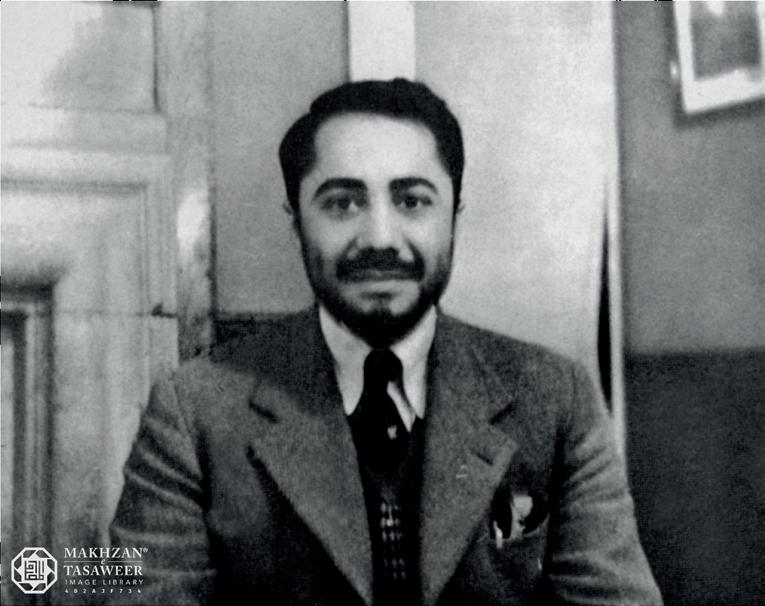
3 July
3 July 1989: On this day, Hazrat Khalifatul Masih IVrh was on a visit to Guatemala, which was the firstever visit by any Khalifatul Masih. Huzoorrh inaugurated the first Ahmadiyya mosque there, the Baitul Awwal Mosque. (Silsila Ahmadiyya, Part 4, p. 123)
3 July 2009: On this day, advising English-speaking Ahmadis, Hazrat Khalifatul Masih Vaa called their attention towards reading The Essence of Islam (a collection of writings, speeches, announcements, and discourses of the Promised Messiahas). Huzooraa stated that every Ahmadi household ought to have these books, which have been translated into English. He also advised English-speaking Ahmadis to study the Promised Messiah’sas books, learn the arguments, and then convince opponents with those arguments.
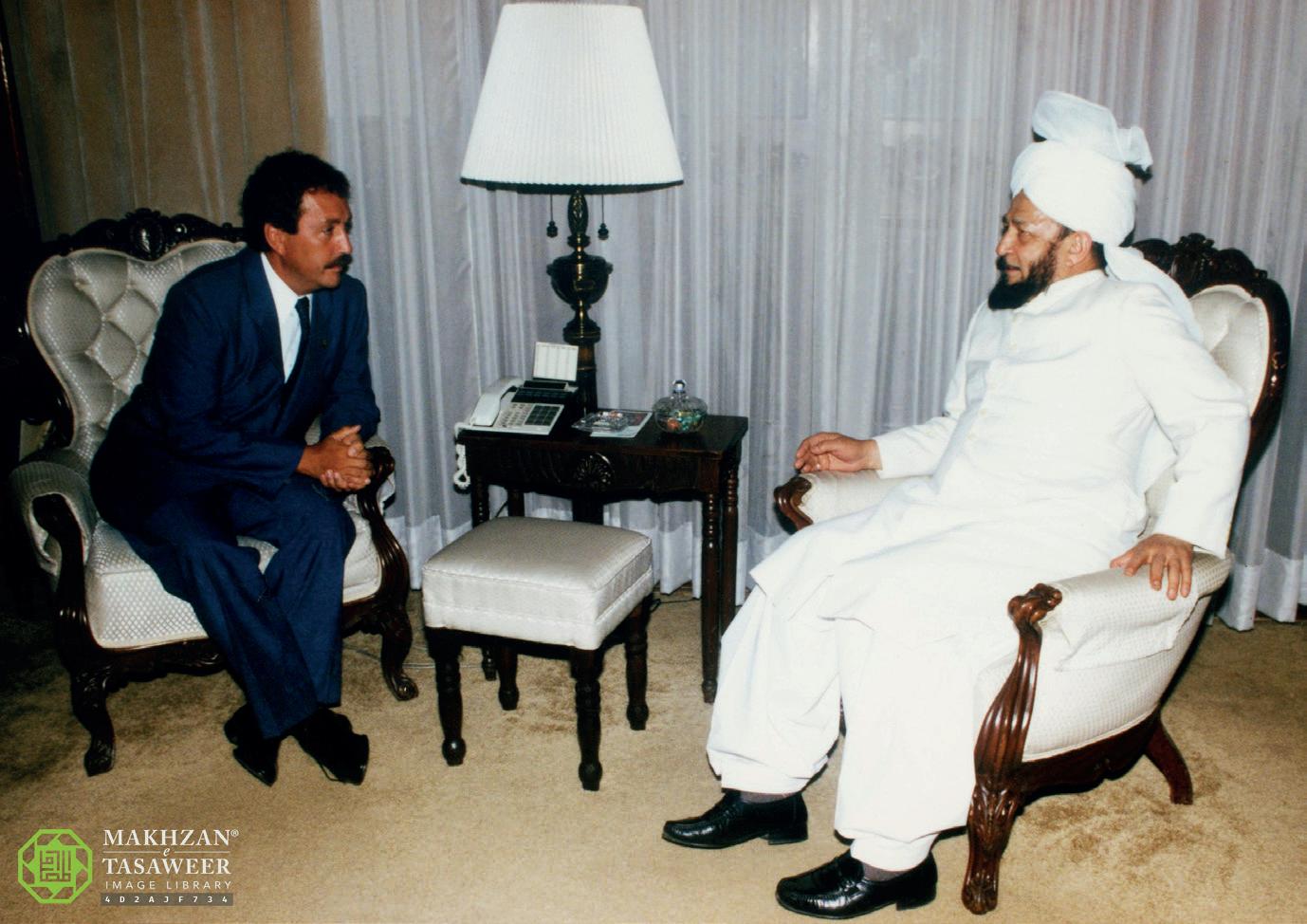
While advising Urdu-speaking Ahmadis, Huzooraa said that they ought to have the complete set of the Promised Messiah’sas books in their homes.
4 July
4 July 1936: On this day, Hazrat Hafiz Mirza Nasir Ahmadrh arrived back in Qadian from London. Earlier, within a month of getting married, he left India and proceeded to pursue postgraduate studies in England. In England, he obtained a Master of Arts degree in Political Science, Philosophy and Economics from Balliol College, University of Oxford. He went back to England on 17 September to complete his studies. (Tarikh-e-Ahmadiyyat, Vol. 7, p. 314)
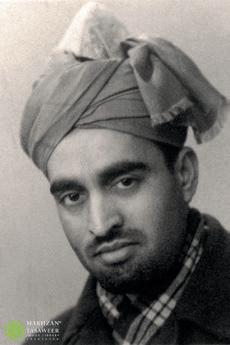
4 July 1944: On this day, Hazrat Musleh-e-Maudra initiated the scheme of Hilf-ul-Fudul in Qadian. This was a revival of the seventh-century alliance created by various Meccans, including the Holy Prophet Muhammadsa, to establish fair dealings and safeguard the rights of marginal segments of society. (Tarikh-e-Ahmadiyyat, Vol. 8, pp. 566568)
4 July 1948: On this day, Hazrat Musleh-e-Maudra delivered a lecture at the Town Hall of Quetta, titled ‘Pakistan ka Mustaqbil’ (Pakistan’s Future), as part of a series of lectures titled “Istihkam-ePakistan” – Consolidation of Pakistan. Huzoorra said that Pakistan’s bright future is only possible when its citizens adopt the teachings of Islam in their practical lives. The details of this series of lectures have already been published in our article, “‘The consolidation of Pakistan’: Lectures by Hazrat Mirza Bashiruddin Mahmud Ahmadra on how Pakistan can see success” (Al Hakam, 6 May 2022, Issue 216, pp. 10-13).
Friday 30 June 2023 | AL HAKAM 4
Hazrat Hafiz Mirza Nasir Ahmadrh when he was a student in the UK
Hafi z
Qudratullah Sahib
Hazrat Khalifatul Masih IVrh granting an audience to the then-president of Guatemala.
30 June - 6 July
100 Years Ago...
4 July 1989: On this day, Hazrat Khalifatul Masih IVrh granted an audience to the then-president of Guatemala. (Silsila Ahmadiyya, Part 4, pp. 856-857)
4 July 2008: During his Friday Sermon on this day, while mentioning the inauguration of the Baitun Nur Mosque in Calgary, Hazrat Khalifatul Masih Vaa said:
“Alhamdulillah, Jamaat-e-Ahmadiyya Canada was able to build another mosque. Although the mosque had been inaugurated with regular prayers, the formal inauguration is taking place through this Friday Sermon. The need for a mosque in Calgary had been felt for a long time, but every act of Allah the Almighty has wisdom behind it. If the mosque had been built a few years ago, perhaps such a big and beautiful mosque might not have been built.”
5 - 6 July
5 July 1932: On this day, Hazrat Musleh-e-Maudra presided over a session of the All-India Kashmir Committee held in Lahore. This committee was formed by prominent Muslim leaders in 1931, and Huzoorra was elected as its first president. For more details on this Committee and Hazrat Musleh-eMaud’sra efforts for the rights of the oppressed Muslims of Kashmir, see “Hazrat Mirza Bashiruddin Mahmud Ahmad’sra services to the Muslim cause: Guidance for Turkey, peace in the Arab world and the Kashmir Movement” (Al Hakam, 19 February 2021, Issue 153, pp. 41-44).
5 July 1989: On this day, during his tour of Guatemala, Hazrat Khalifatul Masih IVrh granted audiences to the country’s ministers of Health and Foreign Affairs. (Silsila Ahmadiyya, Part 4, p. 857)
5 July 1996: On this day, the broadcast of MTA began to be seen around the world through the Global Beam. (Ibid., p. 887)
6 July 1967: On this day, Hazrat Khalifatul Masih IIIrh departed from Rabwah for his first visit to Europe. (Tarikh-e-Ahmadiyyat, Vol. 24, p. 67)
Edification and moral training of new converts
Al Fazl, 18 June 1923

Hazrat Maulvi Muhammad Dinra (1881-1983)
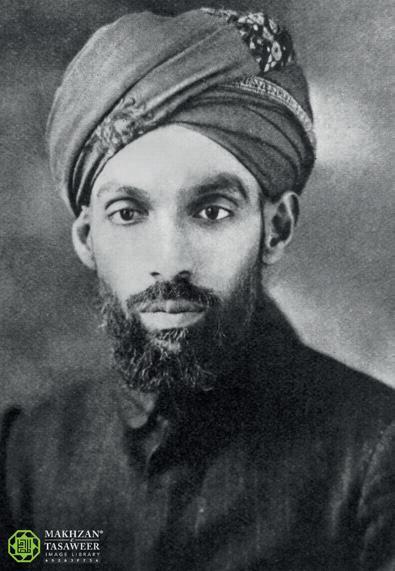
New converts
In the report under discussion, three individuals converted to Islam and joined the Ahmadiyya Jamaat last week. One of them lives in the Philippines and has sent his request for bai‘at from there. The second person is from Trinidad, one of the famous English colonies in the West Indian Islands. The latter named his house “Islamic Mission House” and has also started preaching to others.
During Ramadan, some of the new converts here started fasting regularly. Last Sunday, it was learned that around twelve men were fasting. Some of the sisters here are so committed [to faith] that even with weakness [...] and despite being advised [not to fast], they could not keep themselves from fasting. We pray to Allah the Almighty to increase their faith and grant them perseverance, along with all the other new converts.
Regular jalsa and edification of new converts
Last Sunday, there was a larger audience than usual, and around 60 people participated in the gathering. Before the formal proceedings of the jalsa, I started teaching some of them from the Bible and gave them a lesson on “Islam’s relationship with Christianity”, so that when they meet with other Christians, they can carry out discussions with them from their religious books.
As usual, Hazrat Mufti Sahib[ra] started the actual jalsa with talim-o-tarbiyat [edification and moral training] and formally introduced them to the attributes of Islam and Ahmadiyya Jamaat. After that, he brought to their attention what kind of sacrifice the Jamaat expected from them. He narrated the incident of the great martyr
Hazrat Syed Abdul Latif Sahib[ra] of Kabul in detail to all of them. He told them that unless they are ready to make such sacrifices, they cannot become devoted Muslims and Ahmadis.
After his lecture, Hazrat Mufti Sahibra requested that I [Hazrat Maulvi Muhammad Dinra] say a few words. I presented to them the life accounts of the late Hafiz Moinuddin Sahib, which were published in the latest issue of Al Hakam by Sheikh Yaqub Ali Sahib[ra]. I shed light on how the blessed company of a prophet can produce an extraordinary change in the life of a common man, which can hardly be produced even by the collected teachings of thousands of philosophers. After that, I explained to them the translation and meaning of the first verse of Surah Taha [after the basmalah] and elucidated to them how the Messiah [of Nazareth] could not be a perfect guide for all of us, because if one who claims to be a prophet passes away before completing his mission, then in the light of the Bible, he is not a true messenger. This same criterion for the success [of a prophet] has been presented by the Holy Quran.
In the afternoon, the second jalsa was held. Hazrat Mufti Sahib[ra] gave a lecture on the life of Hazrat Sri Krishna Ji Maharaj. After about half past one, this jalsa came to a successful end.
Arabic lessons and two custodians of one girl
The Arabic lessons are also held twice a week, and some friends are showing great interest in them.
Nowadays, there is a case going on here [in America]. Two women have claimed custody of one girl. One is the actual mother who has been wandering here and there in search of her girl for twelve years and the other woman is the one who has raised this girl as her own. The girl was fraudulently
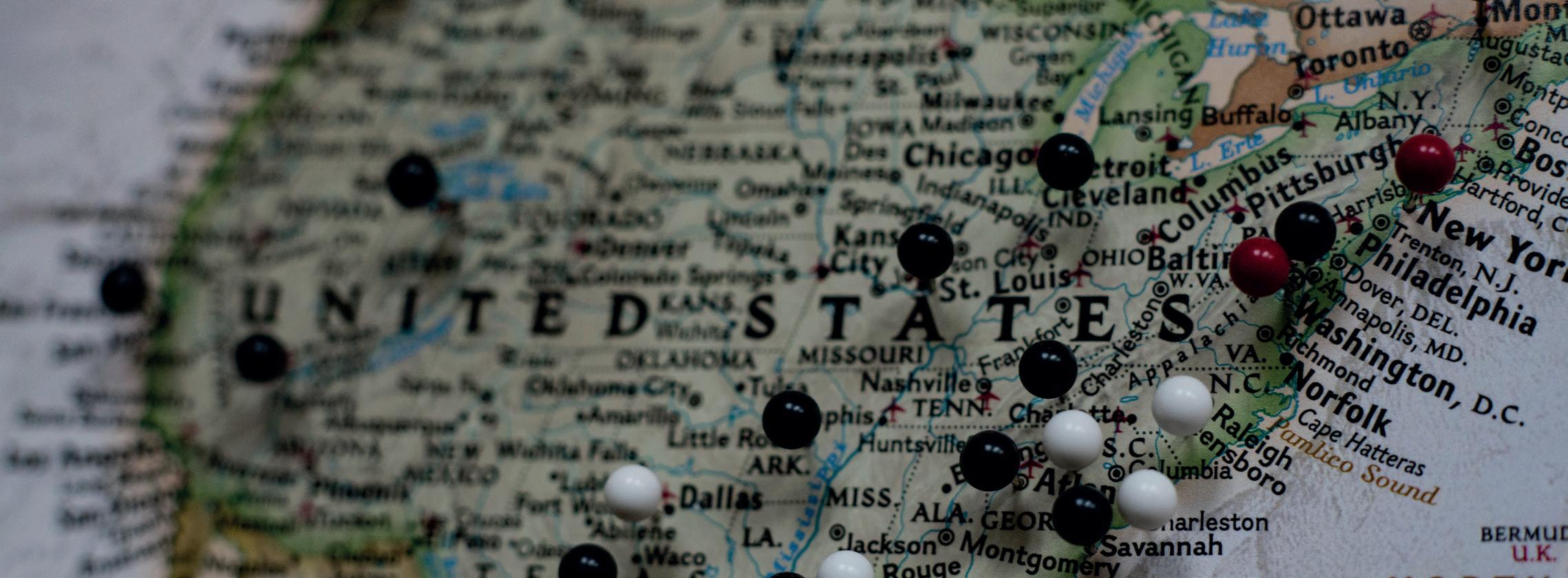
separated from her real mother on the day of her birth. Her mother was in postpartum pains and unconscious at the time.
From the time she regained consciousness, she wandered from city to city for twelve years and married two men, one after the other, on the condition that they would help her find her daughter.
A lot of people are expressing an array of opinions in the newspapers. In general, mothers and other people with kids are saying that the girl should be reunited with her real mother. However, some priests have emphasised in their lectures that the girl should not be given to her real mother. Their main argument is that if the girl is given in the custody of the actual mother, then no one in future will bring up such children from government orphanages.
All of them are indecisive, and the life and teaching of the Messiah [of Nazareth] cannot fully shed light on this matter.
The court has decided that until the age of 14, the girl will stay with the foster mother under the supervision of the government, and the biological mother will be allowed to visit. If the girl would like to reunite with her real mother after 14 years, then no one shall object to it.
Wassalam, Muhammad Din, Chicago, USA.
5 AL HAKAM | Friday 30 June 2023
(Translated by Al Hakam from the original Urdu, published in the 18 June 1923 issue of Al Fazl)
Hazrat Maulvi Muhammad Dinra
Joey Csunyo | Unsplash
Names of Allah
35-46 ‘Call on Him by these’
al-Qāhir, al-Qahhār, al-Jabbār, az-Zāhir, al-Bātin, al-‘Azīz, al-Mu’izz, al-Mudhill, ar-Rāfi’, al-Khāfid, al-Karīm, al-Jawād
37. Yā Jabbār - O Subduer! - رابج اي
Meaning
35. Yā Qāhir - O Supreme! - رهاق اي
36. Yā Qahhār - O Most Supreme! - راهق اي
Meaning
The root of qāhir means to overcome, conquer, subdue, subjugate, overpower, or prevail over. Al-Qāhir is The Overcomer and The Subduer. (Lane’s Lexicon, Root: رهق Entry: رهاق ،رهق) The name Al-Qāhir (The Supreme) does not necessarily have a connotation of anger. Rather, it speaks of the supreme dominance of Allah Almighty over all, both believers and disbelievers. (Haqaiqul-Furqan, Surah al-An’am 6:62, Vol. 2, p. 156) However, the word qahhār (راهق) is the more intensive form of qāhir (رهاق). The name Al-Qahhār (The Most Supreme) emphasises its application of supporting believers against disbelievers. It refers to the One Who breaks the powerful among His enemies and subdues them by destroying them. It emphasises how everyone is powerless in the grasp of His dominating power. (The Ninety-Nine Beautiful Names of God, al-Ghazali, p. 74)
Similar Names
Al-Qawiyy (The Strong), Al-Matīn (The Firm), and Al-Qahhar (The Most Supreme) all refer to power, but with something more added. Qawiyy and Matīn refer to how the description of power is intensified through the concept of strength and firmness. However, Qahhār refers to the effect of that power on those who are overpowered and conquered. (The Ninety-Nine Beautiful Names of God, al-Ghazali, p. 161)
To simplify, Qādir (Possessor of Power) refers to possessing ability, Qawiyy (Strong) refers to the strength to exercise that ability, and Qahhār (Most Supreme) refers to the effect of exercising that ability.
This name is also mentioned under AzZāhir (The Manifest), Al-‘Azīz (The Mighty), and Al-‘Aliyy (The Ever-Exalted).
Use in Prayer
When we pray, the name Al-Qahhār (The Most Supreme) brings to mind the aweinspiring effect of the power of Allah Almighty when He subdues and dominates. When we say Yā Qahhār (O Most Supreme!), we pray that Allah Almighty conquer and subdue the enemies of His servants.
The word jabara means to set a fractured bone back in place. When we break a bone, it is cured by being forced back into place. Jabara also means to compel someone against their will and to induce someone to restore something to a good state. (Lane’s Lexicon, Root: ��ﺟ Entry: رﺎﺒﺟ ،��ﺟ) AlJabbār is the One Who reforms, and the One Who can compel His creatures to obey the
Prophetsa taught us to pray, ي ربجا, (Jami’ alTirmidhi, Kitab as-Salah, Bab Ma Yaqulu Bainas-Sajdatain) meaning ‘reform me’ or ‘make good for me my shortcomings’.
When we say Yā Jabbār (O Subduer!), we express a willingness to face whatever treatment is needed for our spiritual health. We don’t leave a broken bone as it is; we brace ourselves for what we know needs to be done. We don’t go to the doctor and say that we will only accept a treatment that doesn’t involve pain. We go, ready to
we beg Allah Almighty to subdue us and to compel us to reform ourselves.
38. Yā Zāhir - O Manifest! - رهاظ اي
39. Yā Bātin - O Hidden! - نﻃاب اي Meaning
The root of zāhir means apparent or perceptible, and the root of bātin means unapparent or hidden. Az-Zāhir means He Who is Perceptible because His signs and actions are apparent. Al-Bātin means He Who is Imperceptible because His essence is hidden. Also, Az-Zāhir means the Predominant, and Al-Bātin means He Who knows hidden things. (Al-Mufradat, alRāghib, Root: نطب; Lisan al-‘Arab, Ibn Manzur, Root: رهظ; Lisan al-‘Arab, Ibn Manzur, Root: نطب; Lane’s Lexicon, Root: رهظ Entry: رهاظ; Lane’s Lexicon, Root: نطب Entry: نﻃاب)
Similar Names
Az-Zāhir (The Manifest) and Al-Bātin (The Hidden) are opposites.
commands He wishes. However, it should be clear here that this does not denote any compulsion because Allah Almighty has put right and wrong before us and taught that we will receive recompense according to our choices. (Friday Sermon, 16 May 2008, Khutbat-e-Masroor, Vol. 6, pp. 194-195; Friday Sermon, 12 Apr 2002)
Similar Names
Al-Qahhār (The Most Supreme) emphasises conquest and subjugation to bring about the destruction of disbelievers. Al-Jabbār (The Subduer) emphasises subduing and compelling to bring about reformation. Al-Qahhār (The Most Supreme) primarily applies to disbelievers, whereas Al-Jabbār (The Subduer) also applies to believers.
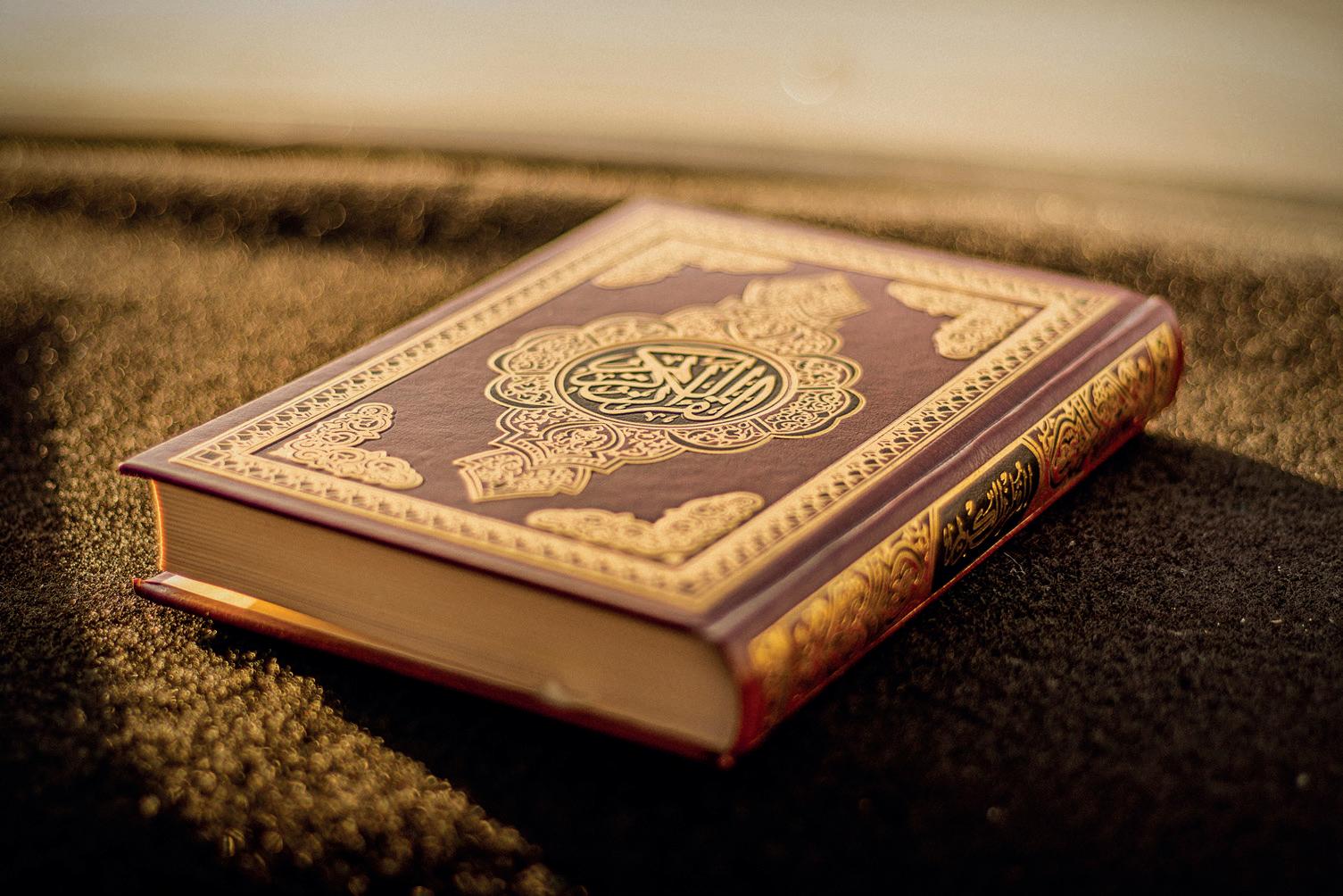

This name is also mentioned under AlMutakabbir (The Great in Majesty).
Use in Prayer
The word jabbār emphasises reformation.
(Friday Sermon, 16 May 2008, Khutbat-eMasroor, Vol. 6, pp. 194-195) The Holy
accept whatever they say. Similarly, when we say Yā Jabbār (O Subduer!), we summon the courage to bear whatever treatment is needed. We put ourselves in the hands of Al-Jabbār (The Subduer), prepared for any procedure necessary to restore us to a good state.
When we say Yā Jabbār (O Subduer!), we beg Allah Almighty to compel us to reform ourselves. For example, many people enlist in the military to develop a militarylike discipline in their lives. Although they can achieve the same discipline enforced in boot camp, they know they don’t have the willpower and strength to do it on their own at home. What they need is a cast that will hold them in place for months until they form the habits they want. They put themselves into boot camp, where a standard of discipline is forced on them for a period of time. Their drill instructors don’t deprive them of their freedom because they voluntarily chose to have their choices taken away. When we say Yā Jabbār (O Subduer!),
Az-Zāhir (The Manifest), Al-Qāhir (The Supreme), and Al-‘Azīz (The Mighty) are synonymous in their meaning of predominance and overcoming. (Al-Bahr al-Muhit, Abu Hayyan, Al-Hadid 57:4, See “ہبلﻏو ہالع اذإ ہيلع رهظ نم ہل بلاغلا ،ءيش لك ىلع يلاعلا :رهاظلا”) Al-Bātin (The Hidden) and Al-Khabīr (The All-Aware) are synonymous in their meaning of knowing what is hidden. (Lisan al-‘Arab, Ibn Manzur, Root: دهش, See “ﻒيﺿأ اذإو وهف ،ةرهاظلا رومألا ىلإ ﻒيﺿأ اذإو ،ریبخلا وهف ،ةنﻃابلا رومألا ي� ديهشلا”)
This name is also mentioned under AnNūr (The Light).
Use in Prayer
The name Az-Zāhir (The Manifest) reminds us that the actions of Allah Almighty are visible in everything. When we see His actions, we see Him everywhere. However, the name Al-Bātin (The Hidden) reminds us that these actions are just signs; the essence of Allah Almighty is hidden beyond our understanding. Az-Zāhir (The Manifest) refers to the signs of Allah, and Al-Bātin (The Hidden) refers to His essence. (AlMufradat, al-Raghib, Root: نطب) When we say Yā Zāhir (O Manifest!), we pray to Allah Almighty while seeing His signs all around us. We pray as if we are seeing Him. Then, when we say Yā Bātin (O Hidden!), we are humbled to realise that we have, in fact, not seen Him at all because His essence is beyond our perception.
The Holy Prophetsa said, “You are The
Friday 30 June 2023 | AL HAKAM 6
Rizwan Khan Missionary, USA
Malik Shibly | Unsplash
Manifest (Az-Zāhir) and there is nothing superior to You, and You are The Hidden (Al-Bātin) and there is nothing besides You.” (Sahih Muslim, Kitab az-zikr, Bab ma yaqulu ‘ind n-nawm; Translation of Hadith from Haqaiq-ul-Furqan, Surah al-Hadīd 57:4, Vol. 4, p. 53) This Hadith describes how Allah Almighty is Az-Zāhir (The Manifest) in His actions. People can be like Him in their actions to a very limited degree, but He is predominant over them. This Hadith also describes how Allah Almighty is Al-Bātin (The Hidden) in His essence. No one can be like Him in essence because He is unique and transcendent.
40. Yā ‘Azīz - O Mighty! - زيزع اي Meaning
The root of ‘azīz means mighty, powerful, or strong. It also means noble, honourable, or glorious. ‘azīz also means one who is honourable and exalted in rank. Al-‘Azīz means The Strong Who overcomes everything, and The Unattainable Who no one can overcome. (Friday Sermon, 19 Oct 2007, Khutbat-e-Masroor, Vol. 5, pp. 423424; Lane’s Lexicon, Root: زع Entry: زيزع ،زع)
Similar Names
The meaning of “overcoming” in Al-‘Azīz is synonymous with the root of Al-Qāhir (The Supreme). (Al-Mufradat, al-Raghib, Root:
, See
The meaning of “strength” in Al-‘Azīz is synonymous with Al-Qawiyy (The Strong). (Lisan al-‘Arab, Ibn Manzur, Root: ززع, See “
”)
Al-‘Azīz (The Mighty) and Al-Mu’izz (The Honourer) come from the same root, the meaning of “honour” being found in both.
This name is also mentioned under AlKarīm (The Generous).
Use in Prayer
Al-‘Azīz (The Mighty) is not just the One Who overcomes and conquers; this name emphasises that He overcomes because of His honour and glory. (Friday Sermon, 22 Feb 2002) The opposite of this root is dhillah (ةلذ), which refers to the humiliation of being weak and submissive to another. (Lane’s Lexicon, Root: لذ Entry: لذ) There is naturally a humiliation seen in being subjected, and a glory in conquest. The root
of ‘Azīz (Mighty) brings to mind the eminence projected by conquerors who seem indomitable. It is not just might and strength but also the feeling of respect it inspires.
An example of respect for might is how we look at representatives of our governments. There are many laws in our country that we may not understand or agree with, but we follow them simply out of respect for the might of the government. Some people defiantly question the commandments of Allah Almighty, but if the police ever pull over that same person, they show such respect that they do not think of questioning the officer. The name Al-‘Azīz (The Mighty) reminds us that when we already obey out of respect for people’s might, we have a greater responsibility to obey Allah Almighty out of respect for His might because He truly deserves to be honoured.
Al-‘Azīz (The Mighty) describes the glory of the invincible and overwhelming might of Allah Almighty. When we say Yā ‘Azīz (O Mighty!), we pray that the glory and might of Allah Almighty fill our hearts with an awe that makes us obedient to Him.
41. Yā Mu’izz - O Honourer! - زعم
42. Yā Mudhill - O Disgracer! -
Meaning
The root of Al-Mu’izz means might and honour. The root of Al-Mudhill means despicable and weak. (Lane’s Lexicon, Root: زع Entry: زعملا; Lane’s Lexicon, Root: لذ Entry: لذ) Al-Mu’izz means The Honourer and AlMudhill means The Disgracer.
Similar Names
The roots of Al-Mu’izz and Al-Mudhill are opposites. Mu’izz has two meanings and refers to giving both honour and might. Similarly, Mudhill has two meanings and refers to causing both disgrace and weakness.
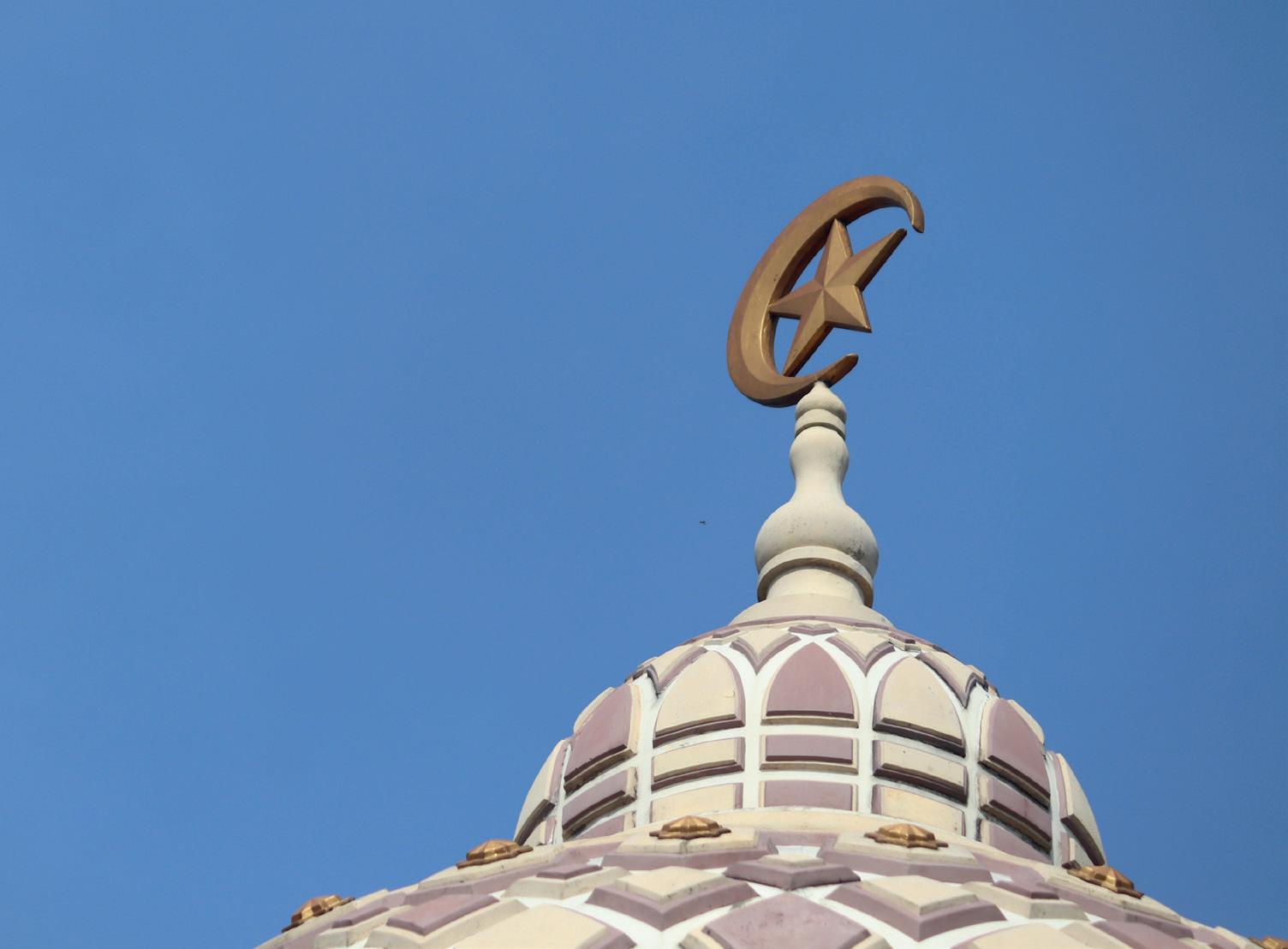
Al-‘Azīz (The Mighty) and Al-Mu’izz (The Honourer) come from the same root. These names are also mentioned under Al-Rāfi’ (The Exalter) and Al-Khāfid (The Lowerer).
Use in Prayer
These names bring to mind how easily
nations are honoured or disgraced. The Holy Quran says:
“She said, ‘Surely, kings, when they enter a country, despoil it, and turn the highest (a’izzah) of its people into the lowest (adhillah).” (Surah an-Naml, Ch.27: V.35)
We should think of any country where there was a revolution in recent history; the glory and might of rulers were broken in days no matter how indomitable they seemed, and the disgraces of the weak were forgotten when they rose to power and eminence. The names Al-Mu’izz (The Honourer) and Al-Mudhill (The Disgracer) remind us that there is no permanence in the honour of this world. Allah Almighty can give it to or take it away from whoever He wishes. When we say Yā Mu’izz (O Honourer!) and Yā Mudhill (O Disgracer!), we pray that Allah Almighty gives honour and might to His servants and that He brings disgrace and weakness on the enemies of His servants.
43. Yā Rāfi’ - O Exalter! - عفار اي
44. Yā Khāfid - O Lowerer! - ضفاخ اي
Meaning
The root of rāfi’ means to raise something. The root of khāfid means to lower something. The name Al-Rāfi’ (The Exalter) is broad and can be applied to elevating someone in rank, station, fame, honour, excellence, paradise, etc., and the name Al-Khāfid (The Lowerer) is the opposite. (Lane’s Lexicon, Root: عفر Entry: عفر; Lane’s Lexicon, Root: ضفخ Entry: ضفخ ،ضفاخلا)
Similar Names
Al-Rāfi’ (Exalter) and Al-Khāfid (Lowerer) are opposites.
Al-Mu’izz (The Honourer) and AlMudhill (The Disgracer) specifically refer to raising or lowering a person in honour and strength. However, Al-Rāfi’ (The Exalter) and Al-Khāfid (The Lowerer) are broad and can apply to anything.
Use in Prayer
These names remind us that Allah Almighty lowers some people to Hell even if they had been mighty in this life, and He exalts others to paradise even if they were weak in this life. (Tafsir Ibn Kathir, 56:4) When we say Yā Rāfi’ (O Exalter!) and Yā Khāfid (O Lowerer!), we bring to mind the One Who raises and lowers us according to His will, and we pray that He exalts us.
The concept of being raised is directly connected with lowering ourselves in prostration. This is why the prayer of, ينعفرا “Exalt my [status],” comes right before we go into our second prostration. (Sunan Ibn Majah, Kitab iqamati s-salat, Bab ma yaqulu bayna s-sajdatayn) The Holy Prophetsa said, ةجرد اهب هللا كعفر الإ ةدجس هلل دجست ال “Every prostration that you perform before Allah will raise (rafa’a) you one degree.” (Sahih Muslim, Kitab as-Salah, Bab Ma Fadlis-Sujud) When we pray, ينعفرا “Exalt my [status],” we beg Allah Almighty to exalt us in acceptance of our lowering ourselves before Him.
45. Yā Karīm - O Generous! -
Meaning
The root of karīm means being highly esteemed and being generous. Karīm means generous, honourable and noble, highly esteemed and valued, and excellent. (Lane’s Lexicon, Root: مرك Entry: ميرك ،مرك)
Similar Names
Al-‘Azīz (The Mighty), Al-Karīm (The Generous), and Al-Majīd (The Ever-Noble) are synonymous in their meaning of “honour.” (Lane’s Lexicon, Root: دجم Entry: دجم) The difference is that the honour that Al-‘Azīz (The Mighty) describes refers to the respect that overwhelming might inspires; the honour that Al-Karīm (The Generous) describes refers to the respect that generosity inspires.
This name is also mentioned under AlJawād (The Generous), Al-Majīd (The Ever-Noble), and Dhul-Jalāli wal-Ikrām (Possessor of Majesty and Bounty).
Use in Prayer
The Holy Prophetsa said, “Indeed, Allah is Hayiyy (One Who acts with others in the manner of him who has shyness, because shyness in its proper sense is not ascribable to Allah Almighty (Lane’s Lexicon, Root: ىح Entry: ىيح)), and He is Karīm (Generous). When a servant raises his hands and supplicates, Allah the Almighty feels shy in returning them to him empty and rejected.” (Sunan Abi Dawud, Kitab al-witr, Bab addu‘a)
The name Al-Karīm (The Generous) reminds us that Allah Almighty has no reluctance in accepting our prayers. If anything, His being honourable and generous means He is reluctant to reject our prayers. When we say Yā Karīm (O Generous!), we let go of our previous estimates of how much we thought He was willing to give us, and we are inspired to beg Him for greater blessings.
46. Yā Jawād - O Generous! - داوج
Meaning
The root of jawād means bountiful or generous. Jawād means one who gives without being asked to preserve the receiver from the embarrassment of asking. (Lane’s Lexicon, Root: جود Entry: جود، جواد) Al-Jawād means The Generous.
Similar Names
Al-Karīm (The Generous) and Al-Jawād (The Generous) are synonymous. The difference is that Al-Karīm additionally has the meaning of honour and nobility.
When the meanings of generosity in karīm and jawād are contrasted, the word karīm emphasises giving after being asked, and jawād emphasises giving before being asked. (Kashf al-Ma’na ‘an Sirr Asma Allah al-Husna, Ibn Arabi, (43) Al-Ism: Al-Karīm)
This name is also mentioned under AlMājid (The Noble).
Use in Prayer
When we ask that Allah Almighty be generous to us, we should naturally have this quality in us. If we find that we are miserly, the name Al-Jawād (The Generous) reminds us to try and fulfil the needs of the needy before they have to express their need to us. The Holy Prophetsa said, “Allah is […] generous (Karīm) and likes generosity; He is munificent (Jawād) and likes munificence.”
(Jami’ at-Tirmidhi, Kitab al-adab, Bab aa ja’a fi n-nazafah)
When we say Yā Jawād (O Generous), we are reminded that Allah Almighty knows those needs of ours that even we may not know, and we ask Him to fulfil them for us without our asking.
7 AL HAKAM | Friday 30 June 2023
“رهقي الو رهقي يذلا :زيزعلاو
زع
”)
ءيش لك بلاغلا يوقلا
وه
اي
لذم اي
اي
ميرك
اي
Mufid Majnun | Unsplash
Answers to Everyday Issues
Part 57

Holding the mushaf during tarawih prayers
Someone from Egypt wrote to Hazrat Amirul Momineen, Khalifatul Masih Vaa, citing the book Fiqh-ul-Masih on the matter of a nonhafiz providing corrective prompting to the imam during congregational tarawih prayers while using a physical copy of the Holy Quran [mushaf]. The individual expressed, “I cannot comprehend how prayer can be offered in this manner.” The quote from Fiqh-ul-Masih is as follows:
“Hazrat Khalifatul Masih IIra was asked about a non-hafiz providing corrective prompting to an imam, who is a hafiz, during congregational tarawih prayers that are held in Ramadan while using a mushaf Huzoorra responded, ‘I have not come across any fatwa by the Promised Messiahas regarding this issue.’ Maulvi Muhammad Ismail Sahib Fazil, however, pointed out that the Promised Messiahas had deemed it permissible.
Holding Quran during taraweeh, questioning in grave
Guidance regarding basic Islamic issues – which Hazrat Amirul Momineen, Khalifatul Masih Vaa has given on various occasions in his written correspondence and during MTA programmes – is being officially published below for everyone’s benefit.


arrangement could be justified under Islamic fiqh, Huzoorra replied, ‘The primary objective is to accustom people to listening to the Holy Quran. This fatwa from the Promised Messiahas arises from necessity and constraint. It is akin to a person who cannot stand to pray and is thus permitted to pray while sitting, or lying down if necessary. Similarly, if someone’s clothes are soiled and they cannot wash them, they pray in that state. In a similar vein, this is not a religious commandment but a provision for exigent circumstances.’” (Al-Fazl, Qadian Dar al-Aman, No. 66, Vol. 17, 21 February 1930, p. 12; Fiqh-ul-Masih, pp. 218- 219) Huzoor-e-Anwaraa, in his letter dated 10 June 2022, provided the following answer to this question:
“During prayers, it is a common practice that if the imam forgets or makes an error in the recitation of the Holy Quran, a congregant [muqtadi] who recalls that particular portion of the Holy Quran can prompt the imam, or rectify the

recite them during prayers. He asked if it was permissible to open the Holy Quran, place it on a stand or table, or hold it in hand during recitation, and then set it aside when bowing down or prostrating and pick it up again for the next rak‘ah. To this, the Promised Messiahas replied, ‘What is the need for this? You should memorise a few Surahs and just recite those.’’ (Zikr-e-Habib, p. 136, [...])
“Therefore, a person ought to recite as much of the Holy Quran as they know in their prayers, and should continue to strive to memorise more of it. This is because the act of memorising and reciting the Quran is itself a virtuous and rewarding endeavour.
“This is precisely why, during the Khilafat of Hazrat Khalifatul Masih IIIrh, when this issue was presented in the Majlis Ifta, Huzoorrh ruled on 17 June 1971, stating, ‘It is not preferable [mustahabb] to read from a physical copy of the Holy Quran even during supererogatory prayers [nawafil]. Furthermore, by allowing this, the objective of promoting Quranic memorisation would be compromised. Therefore, it is undesirable to adopt this method.’ (Register of Majlis Ifta Decisions, p. 49, [unpublished])
“In the books of Hadith and fiqh, there are some reports from the Companions [athar] that indicate that certain honourable Companions, including Hazrat Uthmanra, Hazrat Anasra, and Hazrat Aishara etc., when performing nawafil, would have someone with a copy of the Quran sit next to them. If they forgot something, this person would prompt them, or they would offer nawafil behind an imam who would lead them while reading from a mushaf. (‘Abd al-Wahhab al-Sha‘rani, Kashf al-Ghumma ‘an Jamee‘i l-Ummah, Kitab as-salah, Fasl fi l-fathi ‘ala l-imam; Sahih al-Bukhari, Kitab al-adhan, Bab ’imamati l-‘abdi wa l-mawla)
“While commenting on these athar and the views of the jurists, Hazrat Khalifatul Masih IVrh stated:
“‘As far as the issue of a person offering salat [qari] and another person [sami‘] reading from a mushaf during prayer and the sami‘ then prompting from it is concerned, in my opinion, only Imam Abu Hanifa’srh viewpoint is correct [i.e., such an action invalidates the prayer]. The examples that have been given, such as Hazrat Aisha’sra servant Zakwan leading her in prayer while reading from a mushaf, are not ahadith but athar. These are not such athar, based on which the permissibility of this practice can be established on the authority of the Holy Prophetsa. The authority of athar in such important religious matters is not the same as that of Hadith.’ (Letter from Hazrat Khalifatul Masih IVrh to Secretary Majlis Ifta, 11 May 1993)
“Likewise, Hazrat Khalifatul Masih IVrh, while drawing attention to the rectification of these issues mentioned in the book Fiqhe-Ahmadiyya, issued the following directives to his private secretary, stating:
“‘Please send this page of Fiqh-eAhmadiyya to Rabwah [for review] and ask how these reports became acceptable. They are entirely nonsensical. In those times, the Quran did not exist in the form we have before us today. Instead, it was written on stones, skins, leaves, and the bark of trees. Would they keep stones and skins, among other things, in the mosque to provide corrective prompting? These assertions are such that they cannot be accepted under any circumstances. Such outrageous notions have somehow found their way into our jurisprudence. Hence, a thorough reevaluation is required.’ (Fax to Darul Ifta, from the Private Secretariat, London, 6 January 1998)
“Huzoorra responded, ‘If this practice is permissible, it could yield significant benefits. Arrangements could be made such that instead of one individual listening to all the tarawih prayers [while reading along from a mushaf], four people could listen for two rak‘ahs each, thus each completing six rak‘ahs [without reading from a mushaf].’
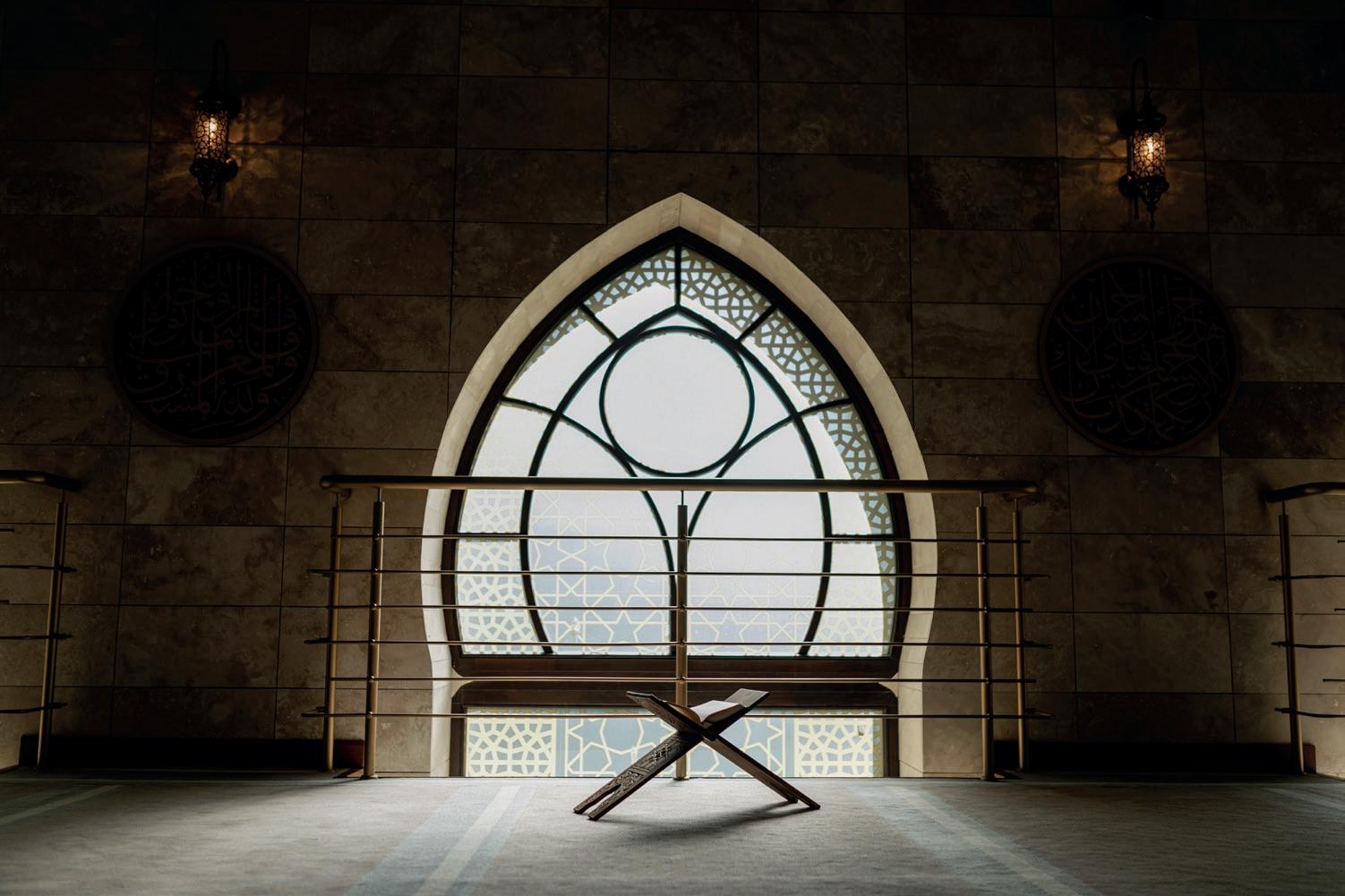


“When asked whether such an

error. However, it is not permissible for a muqtadi to prompt the imam while looking at a physical copy of the Holy Quran. Accordingly, Hazrat Mufti Muhammad Sadiqra elucidates in his book Zikr-e-Habib:
“‘Dr Mirza Yaqub Baig Sahib once submitted to the Promised Messiahas that he finds it difficult to remember longer Surahs of the Holy Quran, but desires to
“Among the Four Jurists, Imam Abu Hanifa’srh stance is that reading from a physical copy of the Holy Quran during prayer invalidates the prayer. However, according to Imam Shafi‘irh, and one of Imam Ahmad’srh opinions, the prayer does not become void. In contrast, according to another viewpoint of both Imam Malikrh and Imam Ahmadrh, such an action is permissible in nafl prayer, but not in obligatory prayers. (Abd al-Wahhab alSha‘rani, Al-Mizan, Bab sifati s-salat, Vol. 2, Alam Al Kotob, 1989, p. 47)

“Further illuminating this matter, Hazrat Khalifatul Masih IVrh stated:
“‘There is no justification for prompting by reading from a physical copy of the Holy Quran during prayers. This practice neither existed during the time of the Holy Prophetsa, nor during the era of the RightlyGuided Caliphs. If an imam made a mistake and someone from the congregation remembered the correct version, they would correct it, or else it was considered forgivable in the Sight of God.’ (Letter to Darul Ifta Rabwah, from Hazrat Khalifatul
Friday 30 June 2023 | AL HAKAM 8
Alena Darmel | Pexels
Masih IVrh, 1 July 1992)
“Thus, my stance on this matter is that one should recite as much of the Holy Quran during prayers as one remembers and strive to memorise more of it.
“However, if one is in such a predicament that they do not recall any part of the Holy Quran—which denotes a state of utmost necessity, and such extreme necessity does not commonly occur—under these circumstances, one can temporarily make use of the tradition attributed to the Promised Messiahas. Yet, similar to how Hazrat Musleh-e-Maudra has deemed this tradition permissible solely in conditions of dire need and compulsion, in my view too, it is not appropriate to make this practice a regular habit.”
Angels questioning the dead in the grave
Someone from Australia wrote to Hazrat Amirul Momineen, Khalifatul Masih Vaa, enquiring, “Is it true that when we pass away, two angels appear to ask us about our faith, who our prophet is, and who our God is? Are we then required to respond from memory before our soul ascends?” Huzoore-Anwaraa, in his letter dated 18 June 2022, gave the following reply to this question:
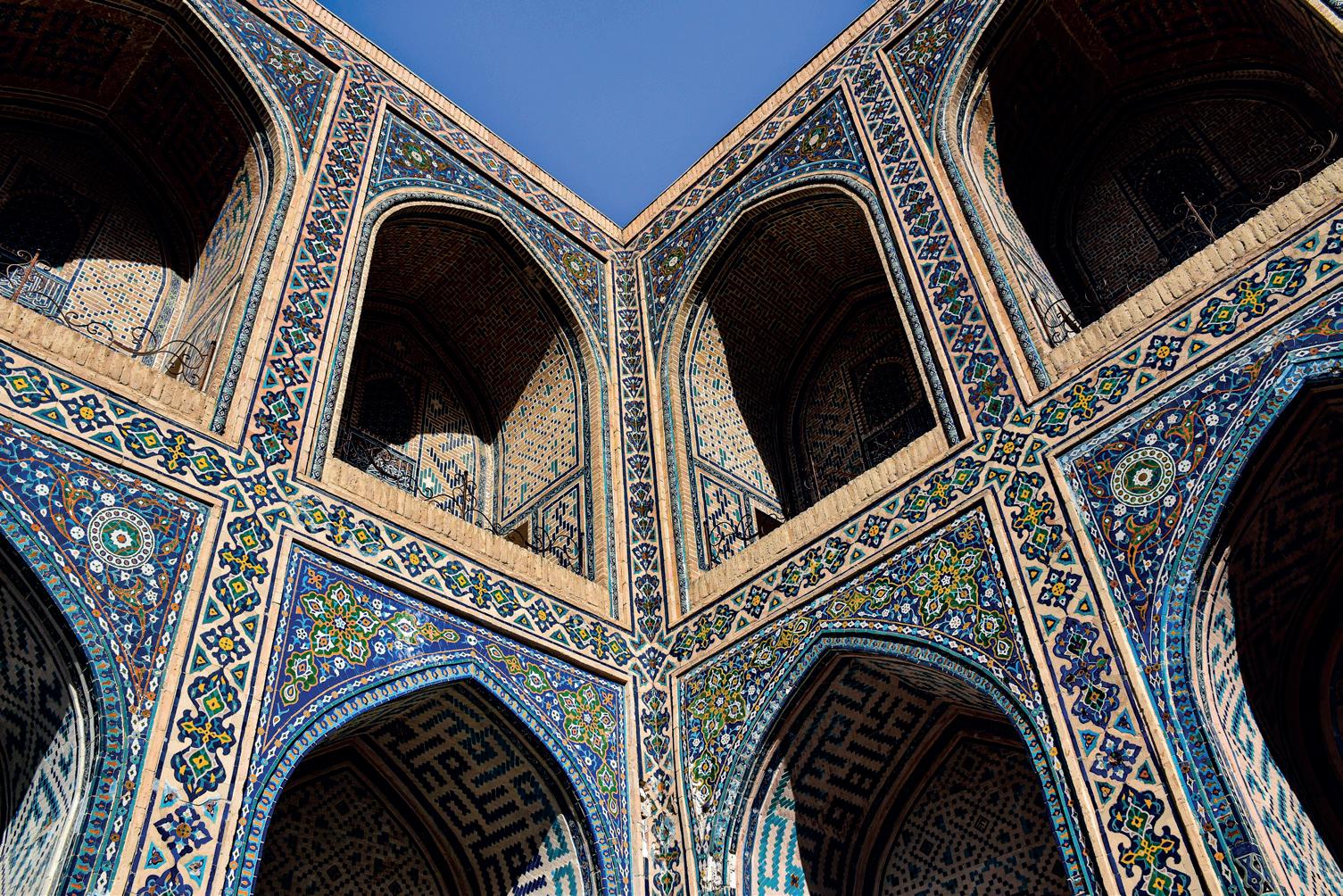
“Different narrations about the questioning and the torment of the grave are found in the Hadith books. What you have asked about is narrated in Sunan Abi Dawud.
“Hazrat Bara’ bin ‘Azib narrated, ‘We went out with Allah’s Messengersa accompanying the funeral of a man of the Ansar. When we reached his grave, it was not yet dug. So, Allah’s Messengersa sat down, and we also sat down around him as if birds were over our heads. He had in his hand a stick, with which he was scratching the ground. He then raised his head and said, ‘Seek refuge with Allah from the punishment in the grave.’ He said it twice or three times.’ (The version of Jarir adds here that, ‘[The Prophetsa said,]) ‘He hears the beat of their sandals when they go back, and at that moment he is asked, ‘O so and so! Who is your Lord, what is your religion, and who is your Prophet?’’’ (Hannad’s version states that, ‘[The Prophetsa said,]) ‘Two angels will come to him, make him sit up, and ask him, ‘Who is your Lord?’ He will reply, ‘My Lord is Allah.’ They will ask him, ‘What is your religion?’ He will reply, ‘My religion is Islam.’ They will ask him, ‘What is your opinion about the man who was sent on a mission among you?’ He will reply, ‘He is the Messengersa of Allah.’ They will ask, ‘Who made you aware of this?’ He will reply, ‘I read Allah’s Book, believed in it, and considered it true.’’ (The version of Jarir also adds here that,) ‘This is the meaning of the following words of Allah:
“‘Allah strengthens the believers with the word that is firmly established…’ [Surah Ibrahim, Ch.14, V.28]
“[The agreed version reads that, ‘(The Prophetsa said,)] ‘Then a crier will call from Heaven, ‘My servant has spoken the truth, so spread a bed for him from Paradise, clothe him from Paradise, and open a door for him into Paradise.’ So some of its fragrant air and sweet scents will come to him, and a space will be made for him as far as the eye can
see.’’
“‘[The Porphetsa] also mentioned the death of the disbeliever, saying, ‘His soul will be restored to his body, two angels will come to him, make him sit up and ask him, ‘Who is your Lord?’ He will reply, ‘Alas, alas! I do not know.’ They will ask him, ‘What is your religion?’ He will reply, ‘Alas, alas! I do not know.’ They will ask, ‘Who was the man who was sent on a mission among you?’ He will reply, ‘Alas, alas! I do not know.’ Then a crier will call from Heaven, ‘He has lied, so spread a bed for him from Hell, clothe him from Hell, and open for him a door into Hell’. Then some of its heat and pestilential wind will come to him, and his grave will be compressed, so that his ribs will be crushed together.’’ (Jarir’s version also adds that, ‘[The Prophetsa said,] ‘[An angel] who
is blind and dumb will then be placed in charge of him, having a sledgehammer such that if a mountain were struck with it, it would become dust. He will give him a blow with it, which will be heard by everything between the east and the west, except by men and jinn, and he will become dust. Then the soul will be restored to him.’’ (Sunan Abi Dawud, Kitab as-sunnah, Bab fi l-mas’alati fi l-qabri wa ‘adhabi l-qabri)
“It is crucial to bear in mind that the matters elucidated in these traditions are predominantly allegorical, and it would be incorrect to interpret them merely on their surface value. An instance related to the grave can be seen in the following verse of the Holy Quran:
“The apparent meaning is that Allah the Exalted causes one to die and then places them in a grave. (Surah ‘Abasa, Ch.80: V.22) However, in reality, it is not God Almighty who places a person in the grave, but other humans who bury the deceased. Moreover, there are many individuals who do not even receive a grave in this world. For instance, those who drown and whose bodies are never recovered, or those devoured by wild beasts. Similarly, those who are cremated do not have graves either. Thus, the reference here pertains to that ‘grave’ that God Almighty creates in the life after death for each individual.
“Hazrat Musleh-e-Maudra elucidates this verse in his explanatory note, saying:
“‘The actual meaning is that in this world, a person’s relatives place him in the grave. However, the real ‘grave’ is that in which God Almighty places the soul of a person.’ (Tafsir-e-Saghir, p. 803, footnote 6)
“Hence, as I mentioned, these are spiritual and allegorical matters. Their occurrence will transpire when the physical life ends and a person presents himself before God Almighty for reward and punishment. All these points elucidate the extraordinary abundance and significance of the rewards and blessings bestowed by God Almighty in the hereafter as a result of virtuous deeds performed in this world. Similarly, they illustrate the severity of the punishment incurred in the hereafter due to the wicked actions performed in this world. All of these are expressed to make humans understand the rewards and the intensity of the difficulties associated with the punishment.”
(Compiled by Zaheer Ahmad Khan, Head of Records Department, Private Secretariat, London. Translated by Al Hakam
Palestine Ambassador to UK visits Ahmadiyya Mosque in Leamington Spa
Shahzad Ahmad Missionary, UK
On 8 June 2023, Mr Husam Zomlot, the Head of the Palestinian Mission to the United Kingdom, conducted a visit to the Ahmadiyya Mosque located in Leamington Spa. He saw the mosque itself, followed by a visit to the adjacent centre, where a quaint event had been organised.
Zafar Bhatti Sahib, the local president, facilitated the occasion by showcasing a brief video that highlighted the life and works of Hazrat Khalifatul Masih Vaa. Subsequent to the video presentation, he also delivered an informative presentation on the various services rendered by the Leamington Spa Jamaat. The evening was further enriched by a shared meal among those present.
Mr Zomlot shared his previous encounters with the Jamaat, including his participation at the UK National Peace Symposium. The evening drew to a close with a token of appreciation from the Jamaat to the esteemed Ambassador – an Arabic translation of the Promised Messiah’sas work, The Philosophy of the Teaching of Islam
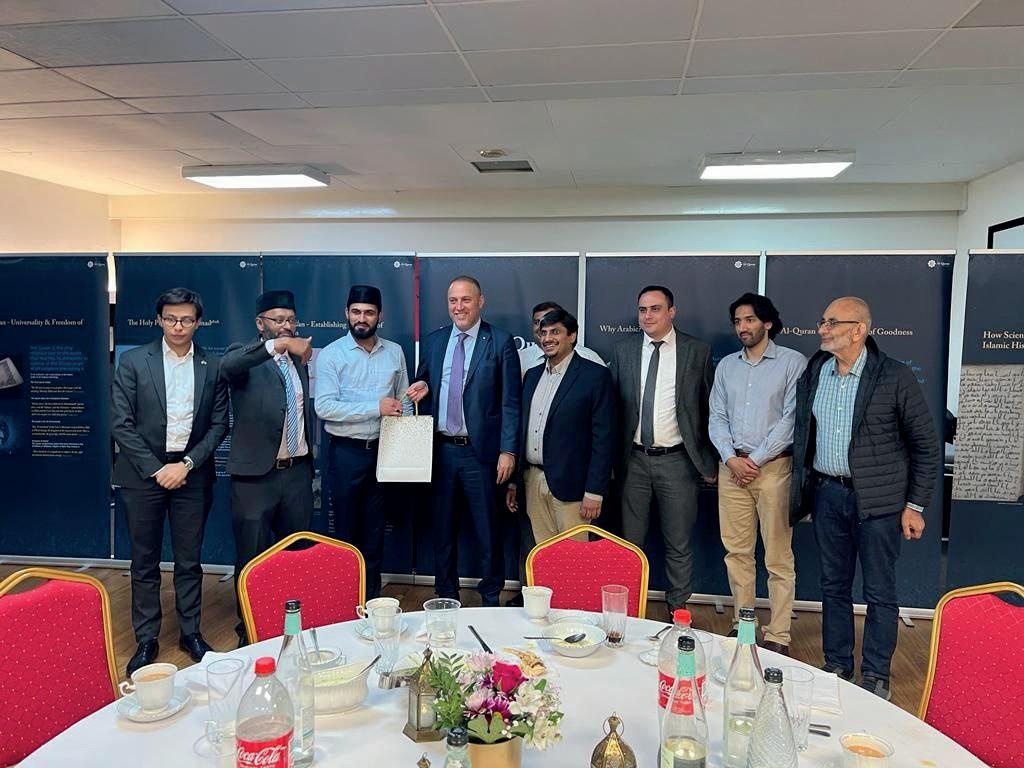
9 AL HAKAM | Friday 30 June 2023
تباثلا
لوقلاب اونما نيذلا هللا تبثي
ہربقاف ہتاما مث
.)
Photo courtesy AMJ Leamington Spa
AXP Photography | Unsplash
The Rituals of Hajj
Depart from Mecca to Mina in the state of ihram
After offering the Fajr prayer in Mina, travel to Arafat
After offering the Fajr prayer at Muzdalifah and the sojourn at Arafat, travel to Mina
In Mina, repeat Rami al-Jamrat anytime between noon to sunset
In Mina, repeat Rami al-Jamrat anytime between noon to sunset
On this day, in Mina:
Offer Zuhr prayer
Sojourn at Arafat after noon
Offer Zuhr & Asr prayers in Arafat
Perform Rami al-Jamrat (the act of throwing pebbles at three stone pillars in Mina) at Jamrah al-Kubra (the big pillar)
First: Perform Rami al-Jamrat at Jamrah al-Sughra (the small pillar)
Then: Perform Rami alJamrat at Jamrah al-Wusta (the middle pillar)
Offer Asr prayer
Offer Maghrib prayer
Offer Isha prayer
At sunset, travel to Muzdalifah
After arriving at Muzdalifah, at Isha time, offer both Maghrib and Isha prayers
Offer animal sacrifice


Shave or trim hair and open ihram
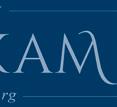

You can go to Mecca to offer Tawaf and Sa‘ee
Then: Perform Rami alJamrat at Jamrah al-Kubra (the big pillar)
If you did not perform Tawaf and Sa‘ee yesterday, then you may do it today
Spend the night in Mina
Spend the night in Muzdalifah
Spend the night in Mina
Spend the night in Mina
First: Perform Rami al-Jamrat at Jamrah al-Sughra (the small pillar)
Then: Perform Rami al-Jamrat at Jamrah al-Wusta (the middle pillar)
Then: Perform Rami al Jamrat at Jamrah al-Kubra (the big pillar)
If you did not perform Tawaf and Sa‘ee yesterday, then you may do it today
If one intends to stay till 13 Dhul-Hijjah, then you may perform Rami al-Jamrat before noon.
PLEASE NOTE: THIS IS A BRIEF OUTLINE OF THE MANASIK (RITES AND CEREMONIES) OF HAJJ. FOR A DETAILED READ AND FURTHER UNDERSTANDING, PLEASE REFER TO FIQH-E-AHMADIYYA
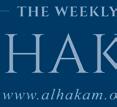

Friday 30 June 2023 | AL HAKAM 10
First day of Hajj 8 Dhul-Hijjah Second day of Hajj 9 Dhul-Hijjah Third day of Hajj 10 Dhul-Hijjah Fourth day of Hajj 11 Dhul-Hijjah Fifth day of Hajj 12 Dhul-Hijjah
كل كيرش ال كملا و كل ةمعنلا و دمحلا نإ ،كيبل كل كيرش ال كيبل ،كيبل مهللا كيبل
Hajj – A brief look at verse 197 of Surah al-Baqarah
Jalees Ahmad
Al Hakam
Hajj, the pilgrimage to Mecca, is the fifth pillar of Islam. Muslims from around the world make this journey every year to Mecca in the last month of the Islamic calendar, known as Dhul-Hijjah. It is compulsory for Muslims who meet the conditions of Hajj to perform it at least once in their lives. Hajj takes place between the 8th and 12th of Dhul-Hijjah. Hajj is a sunnah of the Holy Prophetsa, who performed Hajj once in his life.
The history of Hajj is closely linked to that of Abrahamas, Ishmaelas, and Hagarra (For further details, see: Al Hakam issues of 17 and 24 February 2023 and 16 July 2023)
The Holy Prophetsa is reported to have said that Islam is built upon five pillars: (i) worshipping Allah alone and rejecting all other gods; (ii) establishing prayer; (iii) Zakat; (iv) performing the Pilgrimage to the House of Allah; and (v) fasting during Ramadan. (Sahih Muslim, Kitab al-iman, Hadith 16b)
In the Holy Quran, regarding Hajj, we read:
“And complete the Hajj and the ‘Umrah for the sake of Allah: but if you are kept back, then [make] whatever offering is easily available; and do not shave your heads until the offering reaches its destination. And whoever among you is sick or has an ailment of the head, [should make] an expiation either by fasting or almsgiving or a sacrifice.
But when you are safe, then he, who would avail himself of the ‘Umrah together with the Hajj, [should make] whatever offering is easily obtainable. But such [of you] as cannot find [an offering] should fast three days during the Pilgrimage, and seven when you return home; these are ten complete. This is for him whose family does not reside near the Sacred Mosque. And fear Allah and know that Allah is severe in punishing.” (Surah al-Baqarah, Ch.2: V.197)
Hajj: step-by-step
The above-quoted verse mentions commandments regarding Hajj. Before we briefly delve into what the verse entails, it is important to understand how Hajj, or the Pilgrimage, is performed:
(1) Upon reaching the designated miqaat (locations where the pilgrim assumes ihram), the pilgrim enters the state of ihram These locations are situated outside the haram, but are specifically designated for this purpose.
Note: The miqaat slightly varies in distance depending on the direction from which one travels.
(2) The male pilgrim removes his regular clothing and assumes the ihram while leaving the head uncovered. The female pilgrim has the option of wearing the usual yet simple attire while keeping her face uncovered.
(3) The haji is required to recite the following repeatedly:
“My Lord! I am at Thy service. There is no equal or partner with Thee. So, I am at Thy service alone. All praise belongs to Thee and all blessings are from Thee and all authority rests in Thee. I say again that, there is no equal or partner with Thee. So I am at Thy service alone.” (Sahih Bukhari, Kitab al-Haj, Hadith 1549)
(4) Upon arriving at Mecca and seeing the Holy Ka’bah, one should pray, as this is an opportunity for acceptance of prayer.
The initial action taken by the pilgrim is to complete seven circuits around the Holy Ka’bah. The pilgrim then walks briskly or runs between Safa and Marwah, repeating this action seven times.
(5) On 8 Dhul-Hijjah, the pilgrim departs from Mecca in the morning and heads towards Mina. Upon reaching Mina, the pilgrim remains there to perform the five daily prayers at their designated times, beginning with the midday prayer.
(6) The following morning, 9 DhulHijjah, the pilgrim begins their journey from Mina after offering the Fajr Prayer. They pass through, or by, Mash‘arul-Haram and continue towards Arafat. However,
prior to officially entering Arafat, the pilgrim combines the midday and afternoon prayers.
(7) Following sunset, the pilgrim proceeds back to Muzdalifah or Mash‘ar, where they combine the evening and night prayers and spend a significant portion of their time on prayer and contemplation during this period.
(8) The following day, 10 Dhul-Hijjah, the pilgrim commences their journey back to Mina after performing the morning prayer at Mash‘arul-Haram. Upon reaching Mina, the pilgrim casts seven pebbles at the three designated pillars, beginning with Jamratul-‘Aqabah. This is repeated daily during the pilgrim’s stay in Mina.
(9) On the same day, 10 Dhul-Hijjah, the pilgrim offers their sacrifice, followed by the act of shaving their head. Then, the pilgrim takes a bath and changes into their regular clothing.
(10) The pilgrim then advanced towards Mecca and once again makes seven circuits of the Holy Ka’bah. After this, the pilgrim has the option to return to Mina if they choose to do so.
(11) The duration of the stay at Mina can vary, ranging from a portion of a day up to three or four days. This is what is referred to as تادودعم مايا. This marks the completion of the Hajj.
Throughout this entire period, the pilgrim is encouraged to repeat the aforementioned prayer as frequently as possible. (The above has been explained in detail in Tafsir-e-Kabir and the Five Volume Commentary under Surah al-Baqarah: Ch.2: V.197)
Some points mentioned in verse 197 of Surah al-Baqarah
1. Fulfilling the Hajj and ‘Umrah for the sake of Allah
The first point to ponder over is that God states: “And complete the Hajj and the ‘Umrah for the sake of Allah.”
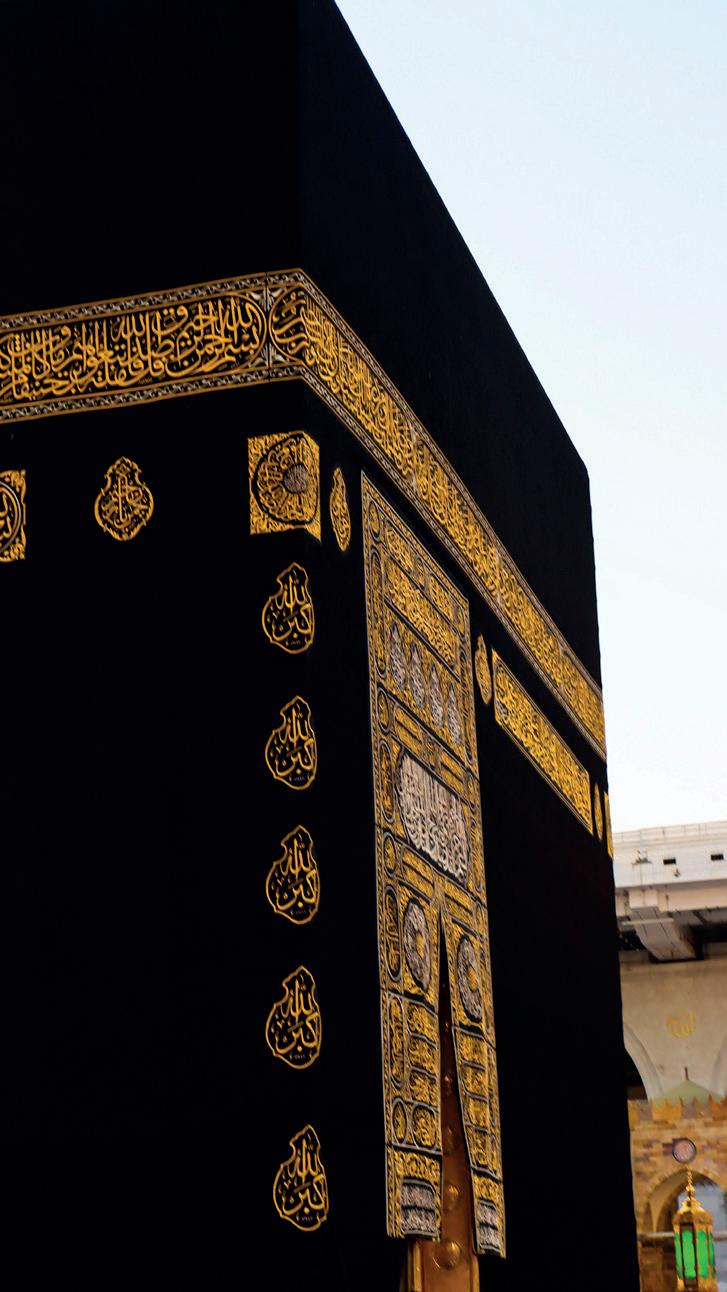
The verse emphasises the importance of fulfilling the obligations of Hajj and ‘Umrah for the sake of Allah. This highlights the significance of performing these acts of worship as a means of devotion and submission to Allah.
2. “If you are kept back, then [make] whatever offering is easily available; and do not shave your heads until the offering reaches its destination.”
If the pilgrim is unable to visit the Holy Ka’bah for Hajj or Umrah due to illness, or war is hindering his path, or other reasons, then, in such a scenario, they can stop and offer the sacrifice “whatever offering is easily available” (2:197) and leave the matter to Allah. You should not “shave your heads until the offering reaches its destination”
(2:197). If the offering cannot be sent to Mecca, it can be performed where the pilgrim is residing, and the meat can be consumed or distributed. “It will be noted that the offering of a sacrifice is obligatory only when a would-be pilgrim is prevented from completing his Hajj or ‘Umrah. In ordinary circumstances, when a person performs a Hajj or an ‘Umrah separately, it is only supererogatory, becoming obligatory only when the Hajj and the ‘Umrah are combined.” (Five Volume Commentary, under Surah al-Baqarah, Ch.2: V.197)
3. “And whoever among you is sick or has an ailment of the head, [should make] an expiation either by fasting or almsgiving or a sacrifice.”
This verse caters to different categories of people who, due to illness, cannot shave their heads. It provides three alternatives, namely, (i) fasting; (ii) almsgiving; and (iii) sacrifice. Fasting can cater to the poor; feeding the needy caters to the middle class; and offering a sacrifice caters to the rich.
Though this verse of the Holy Quran does not specify the requirements for the duration of fasting, the number of needy individuals to be fed, or the type of animal to be sacrificed, we may infer this from other verses of the Holy Quran or the ahadith In one narration, for instance, the Holy Prophetsa prescribed fasting for three days, feeding six poor individuals, and offering a goat as a sacrifice. This narration can be found in the collection of Imam Bukhari. (Sahih al-Bukhari, Kitab al-tafsir, Hadith 4517)
4. “But when you are safe, then he, who would avail himself of the ‘Umrah together with the Hajj, [should make] whatever offering is easily obtainable.”
Following the normal sequence of the verse, we read, “When you are safe”. This phrase refers to a situation in which war or other obstacles have ceased to exist. In such circumstances, individuals have the option to travel to Mecca with the intention of performing the ‘Umrah pilgrimage and then continue to stay in order to perform the Hajj in the following month of Dhul-Hijjah. This is also known as Hajj at-Tamatu‘. In this scenario, we read that such a person should make “whatever offering is easily obtainable.”
5. Fast for “three days during the Pilgrimage, and seven when you return home; these are ten complete.”
In the last part of the verse, Muslims are told that those who cannot find an offering to sacrifice should then fast for three days during the Hajj and then, upon reaching home – that is after taking the ihram off –they complete seven fasts at home. Making a total of ten.
11 AL HAKAM | Friday 30 June 2023
دمحلا نإ ،كيبل كل كيرش ال كيبل ،كيبل مهللا كيبل كل كيرش ال ،كلملاو كل ةمعنلاو
Ayşenur Sağlam| Pexels
‘Middle East in SW18’
Hazrat Musleh-e-Maud leads Eid-ul-Adha at the Fazl Mosque in London, 1955
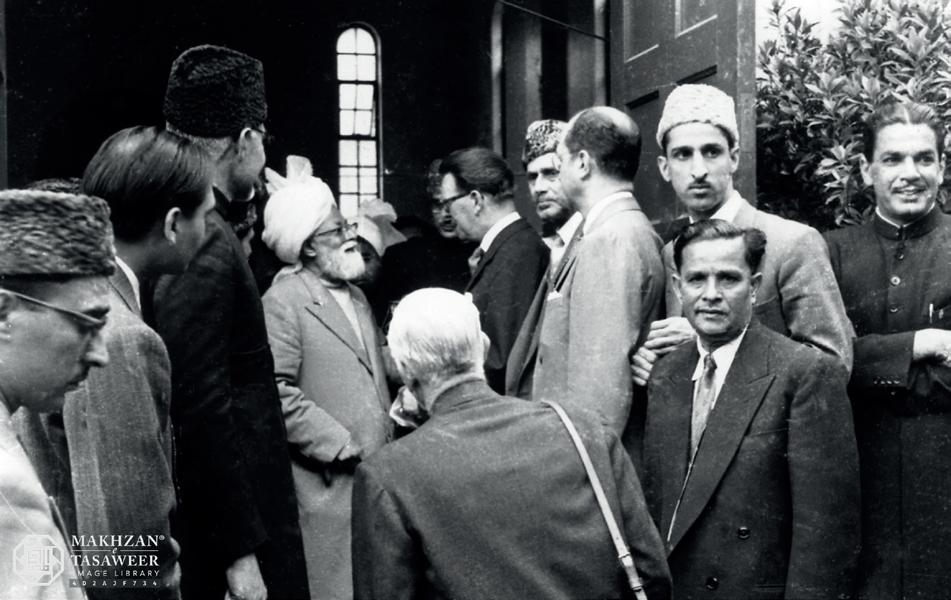

Ata-ul-Haye Nasir
Al Hakam
During his visit to Europe in 1955, Hazrat Musleh-e-Maud, Mirza Bashir-ud-Din Mahmud Ahmadra led the Eid-ul-Adha prayer at the Fazl Mosque in London. This is the only Eid-ul-Adha that Hazrat Musleh-e-Maudra has led in Europe. The total attendance was around 500, including various non-Muslim dignitaries, such as a Soviet attaché Mr Ivan Skripov, ambassadors of Argentina, Chile, Haiti, and the Dominican Republic; and Shaw Desmond (1877-1960) – an Irish author, spiritualist, and founder of the International Institute of Psychical Research. Moreover, Ald E Whitlock conveyed the greetings of the Wandsworth Rotary Club as well. Reporting on this gathering at the Fazl Mosque, the South Western Star of London reported under the heading “Middle East in SW18”:
“Deep in the heart of the Southfields suburban scene rises the dazzling white dome of the London Mosque. [...] Last Saturday,” scores of “fezzed and turbaned men walked through quiet suburban streets on their way to celebrate the festival of Eid-ul-Adha commemorating the offer of Abraham to sacrifice his son as commanded by God.
“Inside the Mosque, which was completely devoid of all decoration and painted a cool green, Hazrat Khalifatul
Masih II[ra] who is visiting England from Pakistan, preached the sermon. A venerable white-bearded figure, he wore a white turban with his beige tunic and trousers. His talk, a simple little homily on the virtues of giving up luxury, was relayed to the garden, where a score of Muslims knelt on prayer mats with their faces turned towards Mecca.
“Then, putting on their shoes, which they had abandoned before entering the Mosque, the worshippers filed into a huge marquee for the traditional feast of lamb stew and rice. [...]
“Non-Muslim visitors included a Soviet attaché, Mr Ivan Skripov, the Ambassadors of Argentina and the Dominican Republic, and Irish author Shaw Desmond. Greetings of the Wandsworth Rotary Club were conveyed by Ald E. Whitlock.” (South Western Star, 5 August 1955, p. 5)
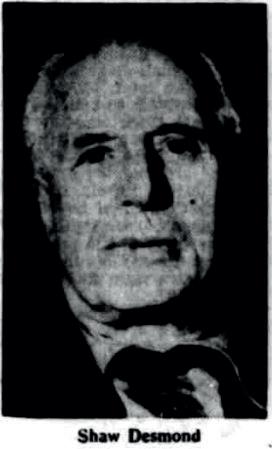
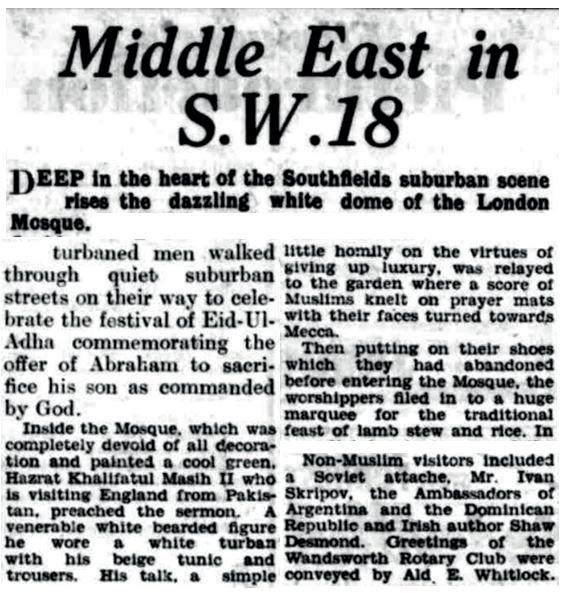
During his Eid Sermon, Hazrat Muslehe-Maudra said that this Eid is called Eidul-Adha by the Muslims, which means the Eid of sacrifices. It is commemorated in the remembrance of Hazrat Ismailas, son of Hazrat Ibrahimas
Huzoorra then mentioned that Allah the Almighty had commanded Hazrat Ibrahimas to sacrifice his son. The Bible says that it was Hazrat Ishaqas, however, the Holy Quran states that it was Hazrat Ismailas Nonetheless, Huzoorra said, the Quranic view is the correct one. Huzoorra said that despite the fact that there is a debate as to which son was commanded to be sacrificed, the categorical truth is that Allah the Almighty had commanded Hazrat Ibrahimas to sacrifice his son, and he submitted to it.
After mentioning the details of that incident, Huzoorra continued:
“Today, we have gathered here to remember that incident. Moreover, hundreds of thousands of people have convened in that uncultivable valley [Mecca] and calling out loudly:
كيبل كل كيرش ال كيبل مهللا كيبل
“It meas ‘O our Lord, I submit just like
whole world, and if one discards the sacrifice of Ismailas, there remains no other way in the world to create a passion to dedicate lives for the sake of God. [...] We can say that Ismailas dedicated his life for the sake of Tawhid, which was an act of benevolence for the world, and the place where he had made this sacrifice, became an everlasting centre of Tawhid. Hence, Ismailas is deserving of God Almighty’s blessings.
“Moreover, Mecca is also deserving of God Almighty’s blessings where [Ismailas] made these sacrifices, and the flag of God’s Unity will always remain established there. Nations will overpower other nations; the flags of various nations will fall one after another, however, the flag of Tawhid, which was raised in Mecca by Ismailas, will remain aloft till the Day of Judgement, no one can ever break or degrade it. [...] This is a Divine decree that can never be altered by anyone. One after another, the [nations of the] world would come under this flag of tawhid. At last, the world will unite there, and a time will come when – just like the slogans of God’s Unity are being raised on this day in Mecca – the slogans of tawhid will be raised from all corners of the world and the takbir [supremacy] of the One God will be announced. [...]
“In the end, I pray to Allah the Almighty that may that day come soon, may the whole world learn the lesson of this Eid, may all the people submit to God, their Creator, and may every dispute, conflict and disagreement efface from the world, may every heart become ‘Ka’bah’ – i.e., the abode of God – and may [the love of] God reside in people’s hearts.” (Khutbat-e-Mahmud, Vol. 2, pp. 386-387)
Ibrahimas had said, ‘I submit.’ There is none equal to You in Your attributes, and there is none worthy of worship except You. I have submitted to propagate Your Unity.’ [...] [Hazrat Ibrahim’sas] act of leaving Ismailas there in Mecca, not only benefited Ismailas but the whole world as well. Ismailas became a great ‘teacher’ to teach Tawhid, and through him, the world succeeded in worshipping the One God. If one removes Mecca from the map of the world, there remains no other centre of Tawhid in the
Al Fazl, in its 3 August 1955 issue, reported that during his Eid Sermon, Hazrat Musleh-eMaudra called the attention of the Western nations to devote their lives – to establish peace in the world – for the sake of God Almighty, following in the footsteps of His chosen personages like Hazrat Ibrahimas and Hazrat Ismailas. (Al Fazl, 3 August 1955, p. 1)
After the Eid-ul-Adha prayer, the Irish author Shaw Desmond had the opportunity to meet Hazrat Musleh-e-Maudra and ask various questions as well. Huzoorra himself mentioned this meeting during his Eid-ulFitr Sermon on 12 May 1956. (Al Fazl, 18 April 1958, p. 4)
Friday 30 June 2023 | AL HAKAM 12
The Birmingham Post, 24 December 1960
South Western Star, 5 August 1955
Hazrat Musleh-e-Maudra delivering a Friday Sermon at the Fazl Mosque, London, 1955
Some guests having a discussion with Hazrat Musleh-e-Maudra , Fazl Mosque, London, 1955
Generosity and compassion of the Holy Prophet Muhammad
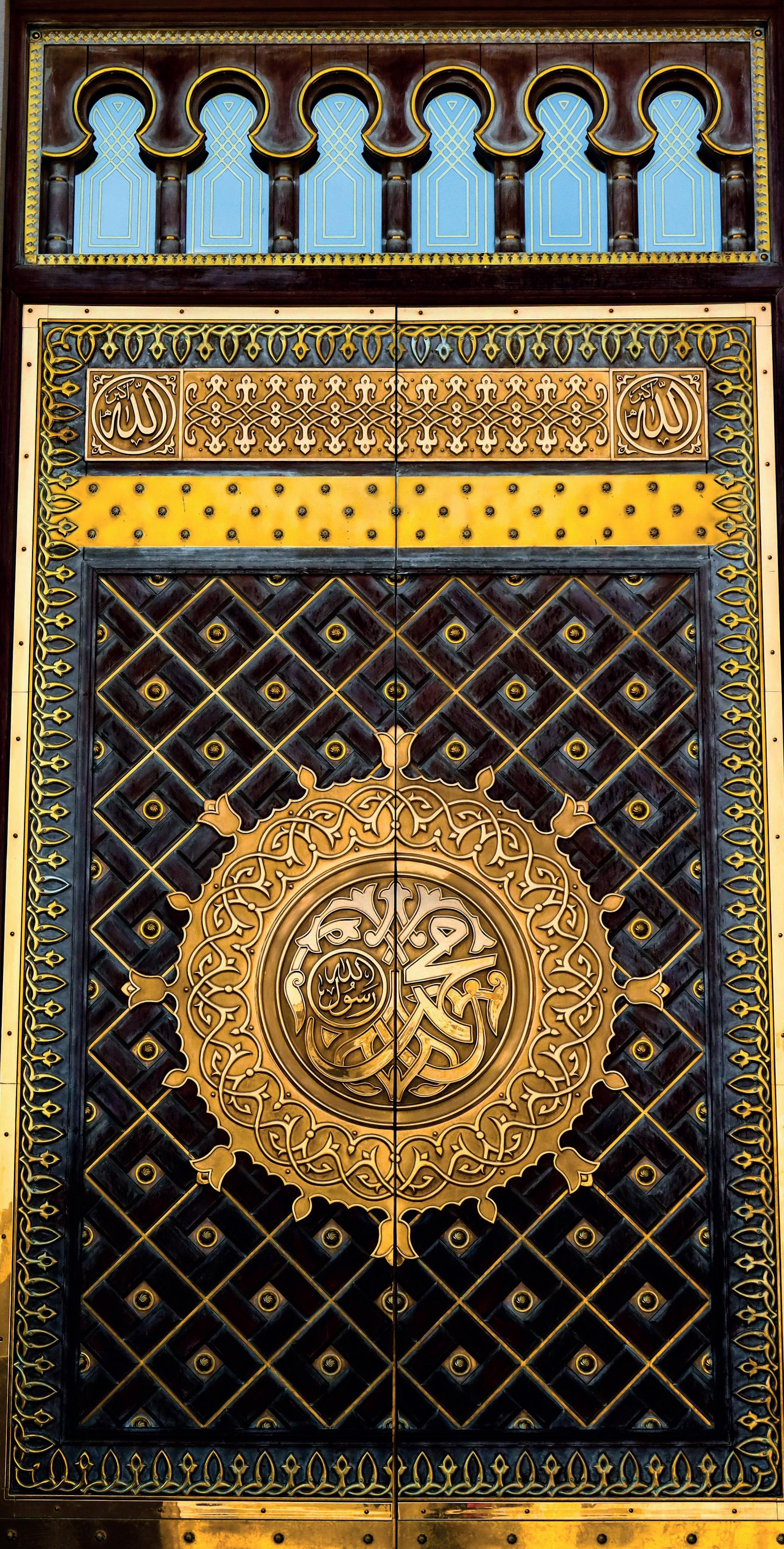
Student Jamia Ahmadiyya UK
The Holy Prophetsa was sent to the world as a mercy for all of mankind. He came with the highest moral standards for the sake of mankind and urged them to abandon evil practices and follow his wonderful example so that they may draw closer to Allah, as mentioned in a hadith:
The Messenger of Allah, may Allah bless him and grant him peace, said, “I was sent to perfect good character.”(Muwatta Imam Malik, Book 47, Hadith 1643)
No one could ever provide a better example of generosity than the Holy Prophetsa did. It was for this reason that Abdullah ibn Abbasra narrated that the Holy Prophetsa was the most generous of all people (Sahih al-Bukhari, Kitab al-munaqib, Hadith 3554).
The Holy Prophetsa used to give others not only what he desired for himself but also sacrificed his own necessities and essentials for others – this was in line with Quranic teachings:
“Never shall you attain righteousness unless you spend out of that which you love; and whatever you spend, Allah surely knows it well.” (Surah Aal-e-Imran, Ch.3: V.93)
Students of history and orientalists acknowledge this quality. For instance, the famous Sir William Muir states in his biography of the Holy Prophetsa that he was the most generous of men and due to his modesty and kindliness, patience, selfdenial, and generosity, “he disliked saying ‘No.’” (Life of Muhammad, Sir William Muir, Smith, Elder & Co., London, 1877, p. 525)
Below, I shall share some instances from the noble life of the Holy Prophetsa that exemplify his high and noble qualities and demonstrate his extraordinary generosity.
Story of eight dirhams and lessons in generosity and empathy
Once, the Holy Prophetsa went out to the market with eight dirhams to buy a shirt. On the way, he noticed a girl crying. While everyone else ignored her, the Holy Prophetsa went out of his way to inquire about the reason for her tears. She explained that she had gone out to purchase a household necessity with two dirhams, but had unfortunately lost them. The Holy Prophetsa was deeply moved by her plight and gave
her two dirhams from the eight he had.
Then, the Holy Prophetsa continued his journey to the market, where he bought a shirt for four dirhams. Before returning, he saw an aged man proclaiming, “Whoever clothes me with a garment, may Allah clothe him with the garments of paradise.” Upon hearing these words, the Holy Prophetsa, driven by his love and generosity, gave the shirt he had just brought to the elderly man.
The Holy Prophetsa then used the remaining two dirhams to purchase another shirt and left the market.
On his way out, the Holy Prophetsa encountered a female slave who was sitting down and crying. In the time before the advent of the Holy Prophetsa, women had little to no respect, and the treatment of slaves was unimaginably harsh. They were often ignored by everyone. However, when the Holy Prophetsa saw how distraught she was, he approached her and asked why she was upset. She responded, “I fear punishment from my master due to the length of my absence.” The Holy Prophetsa consoled her by assuring her that he would speak to her master on her behalf. Upon reaching the house, he knocked on the door and greeted them with “salam.” He then spoke to the master and his family, requesting their forgiveness for the female slave. They not only willingly forgave her but also granted her freedom. (Nuzhat almajalis wa-muntakhab al-nafa’is, al-Saffuri, Bab fi fadli s-sadaqati wa fi’li l-ma‘rufi khususan ma‘a l-qaribi wa l-jari l-gharib) A plethora of lessons can be learned from this one incident, such as:
1. The Holy Prophetsa gave his shirt, which was his favourite type of clothing (Sunan Abi Dawud, 4025) without hesitation in order to help another person.
2. The Holy Prophetsa did not seek any recompense.
3. He gave his time to a female slave, whom the Arabs looked down upon with great scorn, and used them for their personal benefits. (The Life & Character of the Seal of Prophets, Vol. 1, p. 187)
We can learn from this that we should give our time and aid to those who are in need and, as stated by Kahlil Gibran, “Generosity is not in giving me that which I need more than you do, but it is in giving me that which you need more than I do.” (Sand and Foam, 1926, p. 34)
13 AL HAKAM | Friday 30 June 2023
Abdullah Tahir
قالخألا نسح ممتأل تثعب
ءىش نم اوقفنت امو ۬ؕ نوبحت امم اوقفنت ىتح ربلا اولانت نل ميلع ہب هللا ناف
Ayşenur Sağlam| Pexels Continued on next page >>
Giving everything one owns
The Holy Prophetsa had a strong desire to distribute everything for the sake of others on numerous occasions. For example, it is narrated in Sahih al-Bukhari that the Holy Prophetsa said:
“If I had gold equal to the mountain of Uhud, it would not please me that it should remain with me for more than three days, except an amount which I would keep for repaying debts.” (Sahih al-Bukhari, Kitab alistiqraz, Hadith 2389)
The Holy Prophetsa was selfless and disliked possessing anything that he did not truly need. His character was such that if someone asked for something, he would go to great lengths to assist them, even if it meant utilising his own essential resources, like food and drink. This brings me to my next point.
The Holy Prophetsa never said ‘no’ to a legitimate request
Throughout his life, the Holy Prophetsa never said “no” to any request, demonstrating his deep sense of compassion and commitment to serving others.
In a famous hadith, we learn:
“It never happened that Allah’s Messengersa was asked for anything and he said: No.” (Sahih Muslim, Kitab al-Fazail, Hadith 2311a)
In proof of the above narration, the Promised Messiahas stated, in regards to the high standard of the generosity of the Holy Prophetsa:
“There was a time when the Holy Prophetsa owned even more sheep and goats than the Caesar and Chosroes.” (Malfuzat [English], Vol.1, p. 130) In this regard, “One person is reported to have said that never in his life had he seen anyone possess such abundant wealth. The Holy Prophetsa gave the entire flock to that person, upon which the man immediately said: ‘Without doubt,
you are a true Prophet, for such generosity cannot be exhibited by anyone else.’ Hence, the exemplary morals of the Holy Prophetsa were such that the Quran makes the following statement:
ميظع قلخ ىلعل كناو
“‘And thou dost surely possess high moral excellences.’ [Surah al-Qalam, Ch.68: V.5]” (Malfuzat [English], Vol.1, p. 98)
His
mercifulness to people of other faith
The generosity of the Holy Prophetsa was not simply limited to his own people; rather, it extended to people of all tribes and backgrounds, both familiar and foreign. Hatim al-Tai was regarded as a Christian king of the Banu Tayyi tribe. He was also the father of Adiyy ibn Hatim al-Tai, who was a companion of the Holy Prophetsa. Hatim alTai was known to be a generous man during the period of jahiliyyah, as mentioned by Ibn Kathir.
“Hatim was a man of such distinction and generosity that many extraordinary events and strange accounts are associated with him. However, by these deeds he did not seek the grace of God or the hereafter but was motivated by desire for fame and recognition.” (The Life of the Prophet Muhammad, English Translation of Ibn Kathir’s Al-Sira Al-Nabawiyya, Vol. 1, p. 75)
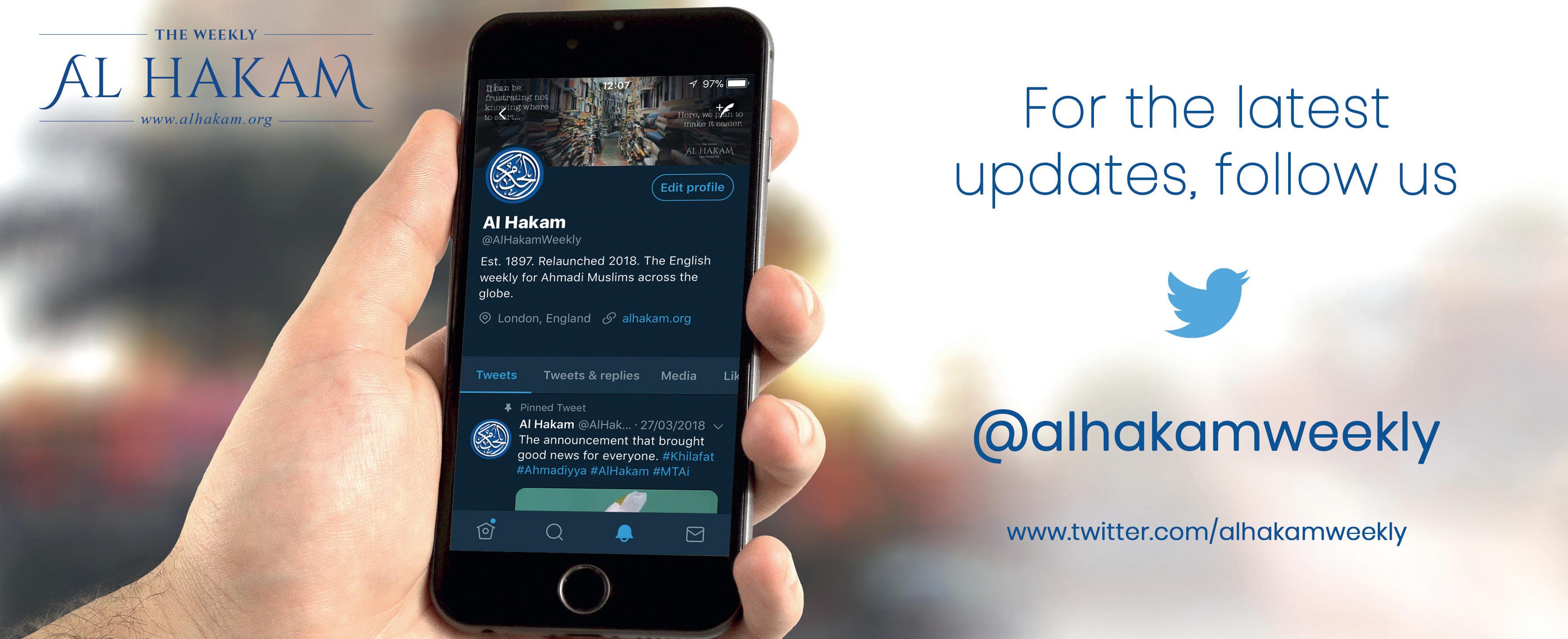
The Holy Prophetsa once took captives of Banu Tayyi and among the captives was the daughter of Hatim al-Tai. She pleaded to The Holy Prophetsa:
“O Muhammad[sa], will you not release me and spare me the malicious gloating of the Arab tribes, for I am the daughter of the leader of my people. My father was the guardian of our sacred objects, he relieved the distressed, fed the hungry, clothed the naked, gave generous hospitality, provided the best of food, spread peace abroad and never refused the request of the needy. I am the daughter of Hatim al-Tai.” (Ibid. p. 77)
The Holy Prophetsa responded:
“O girl, all these qualities truly describe the believers. Had your father been a believer, we would certainly have been merciful to him. Release her, for her father
was a man who loved to perform good deeds, and God Almighty loves good deeds.”
(Ibid. p. 77)
In regards to this incident, Hazrat Musleh-e-Maudra states:
“It is evident from this that Allah’s Messengersa not only recognised the virtues of non-religious people in practice, but also treated those who belonged to them with kindness. And blessed them with his favours. So the result was that during the time of Hazrat Abu Bakr, when the Tai tribe joined the rebellion due to the instigation of some people, the son of Hatim al-Tai, who himself was running away from Islam, came and explained to his people and made them pledge their allegiance again.” (Tafsire-Kabir [2023], Vol.9, p. 148 )
The Holy Prophet’ssa display of selflessness and compassion was incomparable. Simply for the sake of being good to mankind and seeking the pleasure of Allah, he freed an entire non-Muslim tribe due to the generosity of a king who
belonged to that tribe.
As Muslims, we strive to follow the footsteps of the Holy Prophetsa. In order to do so, we must exhibit generosity and selflessness towards everyone, regardless of their religion or background. Moreover, if anyone shows kindness and generosity towards us, we should reciprocate that treatment in an even greater manner. This embodies the true meaning of the Quranic verse.
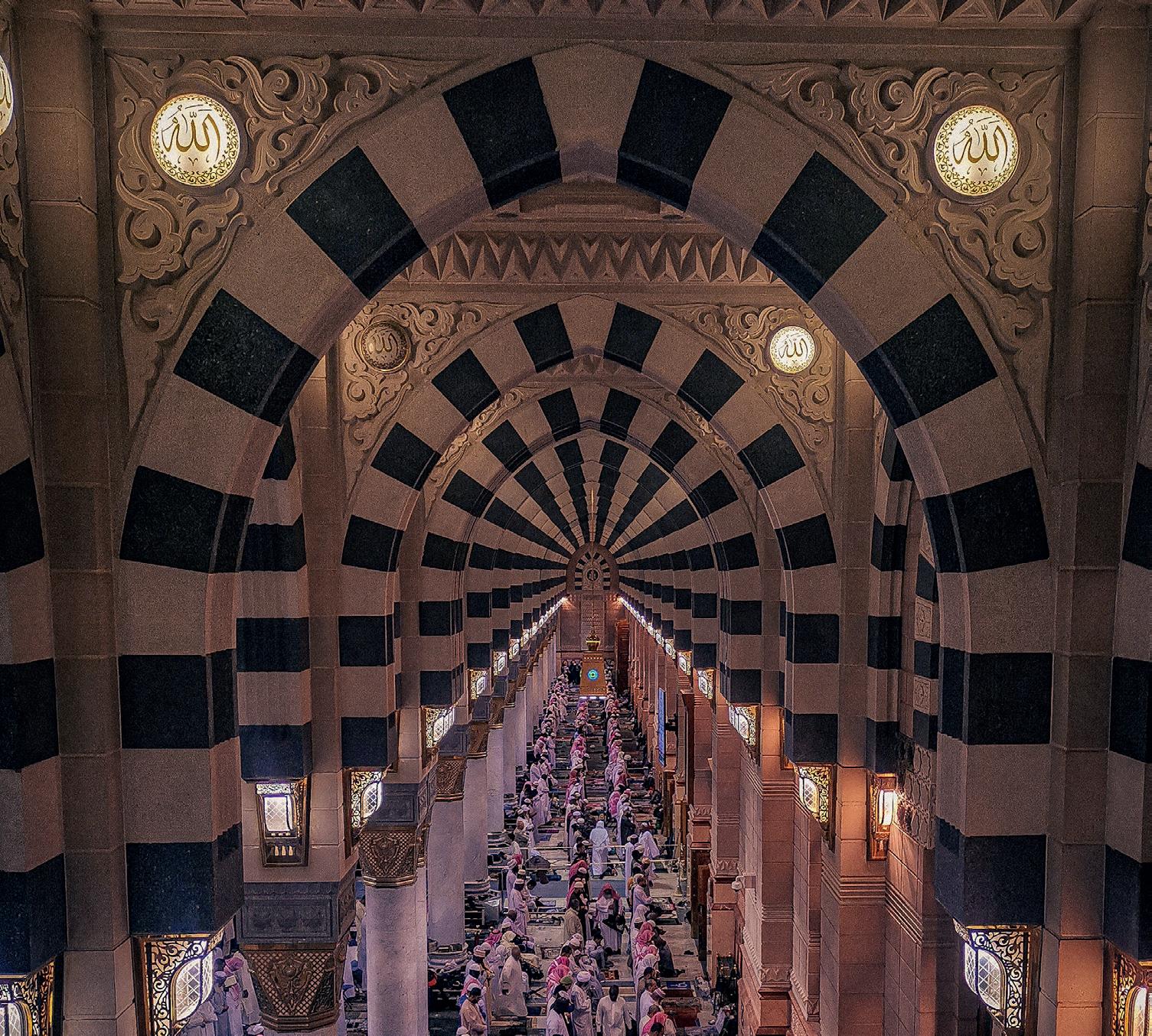
“And when you are greeted with a prayer, greet ye with a better prayer or [at least] return it. Surely, Allah takes account of all things.” (Surah an-Nisa Ch.4:V.87)
Following the noble example of the Holy Prophetsa is what all Muslims should strive for. For it is in following his footsteps and obeying him that we can truly win the pleasure of Allah.
Friday 30 June 2023 | AL HAKAM 14
ثالث ىلع رمي ال نأ ي رسي ام ،ابهذ دحأ لثم ي ناك ول نيدِل ہدصرأ ءىش الإ ،ءىش ہنم يدنعو
ال لاقف طق ائيش ملسو ہيلع هللا ىلص هللا لوسر لئس ام
ناك هللا نا ؕ اهودر وا اهنم نسحاب اويحف ةيحتب متييح اذاو ابيسح ءىش لك ىلع
<< Continued from previous page
Saad Alkot| Pexels
100 Years Ago...
Appreciation and suggestions for The Review of Religions, 1923
The Review of Religions [English], July 1923
We have received the following letter from Mr Ali Haidar alias LK Hyde of 3324, Aldrich Avenue, South Minneapolis, Minnesota, America. Recent irregularities in the publication of “The Review of Religions” though largely due to unavoidable causes hardly justify the publishing of such compliments on our part. We put the pleasure of our correspondent, however, above other considerations and also hope to hereby arouse ourselves to a state of harder work for the amelioration of the paper’s lot. As to the proposal contained in the latter portion of the letter, we have only to say that the matter is under our consideration. —The Editor, The Review of Religions [July 1923]
Dear Mr Editor [of The Review of Religions],
Through the courtesy of the honorable Dr Mufti Muhammad Sadiq, I have been able to peruse a number of copies of “The Review of Religions” and I desire to take this means of conveying to you my sincere
appreciation of the true worth of your admirable publication.

Unquestionably, “The Review of Religions” is the highest calibre of ecclesiastical journalism, not only because it is so broad-minded to the Christians and Buddhists, etc., but because it is morally, spiritually, and physically the very breath of a living Islam. Your magazine typifies the spirit of Islam in a way that no other publication would be able to, and not only this, but it is also the personification of tolerance.
If only it were possible to send “The Review of Religions” into the homes of the ministers of the various so-called Christian denominations, what a light they would see about true Islam as it really is.
In a recent issue of the April 1923 “The Missionary Review of the World”, there is an article on The Situation in the Moslem World, in which the writer, Dr Samuel M Zwemer, editor of “The Moslem World” says, “Our work among Mohammedans has been
comparatively fruitless.”
As a newspaper man and a journalist, I think that if the great news-gathering associations of the United States such as the Associated Press, the United Press, and the International News Service, were systematically bombarded with news items about the greatness of Islam, they might possibly publish some favourable articles on the situation in the Near East.
If there is anyone who is intolerant and racially prejudiced, it is the ministers who preside over the thousands of pulpits in America, and it is my hope that something will be done to remove this unfair state of mind.
May the Peace of Allah be with you.
Most sincerely,
(Ali Haidar) Laurence K Hyde.
(Transcribed and edited by Al Hakam from the original in The Review of Religions [English], July 1923)
Peace conference held by Jamaate-Ahmadiyya Newcastle, UK
Ataul Mujeeb Rashed Missionary-in-charge, UK
Jamaat-e-Ahmadiyya Newcastle, UK, held a peace conference on 4 June 2023, at the Britannia Hotel. The topic of the conference was “How to achieve eternal peace”. The attendance at the conference was around 120, including the Lord Mayor of Newcastle, Councillor Veronica Dunn, the Worshipful Mayor of Gateshead, Councillor Eileen McMaster, the Mayor of Ponteland, Councillor Karen Overbury, and my humble self. There was representation from the Newcastle and Hexham Diocese Interreligious Team, the Sikh Temple, and the Chronicle.
The conference started with a recitation from the Holy Quran and its English translation. Minhas Younas Sahib, the local president, greeted all the distinguished guests in his welcome note and gave a rundown of the event.
Regional missionary, Tahir Selby Sahib then presented an introduction to the Jamaat and mentioned the community work that has been carried out by the Community members of Newcastle and Hartlepool. A few of the activities he mentioned included charity walks, New Year’s cleaning sessions, food donations, and fundraising for the Poppy Appeal and other charities.
The first speaker was Councillor Veronica Dunn, Lord Mayor of Newcastle. She acknowledged the pervasive usage and extensive historical background of the word “peace”. Councillor Dunn highlighted that peace finds application in both religious and civil contexts. Furthermore, she emphasised that peace could encompass a multitude of interpretations and hold various meanings.
The second speaker was the Worshipful Mayor of Gateshead, Councillor Eileen McMaster. She defined positive peace as
the attitudes, institutions, and structures that create and sustain a peaceful society. This, she said, provided a framework for understanding and addressing the multiple and complex challenges facing the world. She also mentioned that she wants to pay tribute to the Ahmadiyya Muslim Community, as their work highlights the importance of coming together to create a stronger and more inclusive community that promotes understanding and harmony.
The third speaker was Councillor Karen Overbury, the Mayor of Ponteland. She emphasised the importance of conveying to our children that, while happiness may fluctuate, peace should endure.
The closing speech was delivered by my humble self, where I expressed my appreciation for the insightful contributions of the guests and commended the concise yet impactful speeches delivered by the mayors. I emphasised several crucial
points necessary for the attainment of peace. I discussed the teachings of Islam concerning the rights of neighbours and said that it is the duty of Muslims to show kindness to all individuals without discrimination based on religion, as this is essential for establishing peace.
After this, I answered some questions from the audience regarding women’s rights in Islam, the difference in beliefs between Ahmadi Muslims and nonAhmadi Muslims, the Islamic belief of Jihad, and the institution of Khilafat.
The conference formally ended with silent prayer.
A Quran exhibition had been set up, where several translations of the Holy Quran were on display. There was also a stall in which literature published by Jamaat was displayed. Many guests visited the exhibition and the stall. The event concluded with dinner.
15 AL HAKAM | Friday 30 June 2023
Florian Klauer| Unsplash
President of Kosovo Police Union visits centre of Jamaat-e-Ahmadiyya
Besmir Yvejsi Kosovo Correspondent
On 5 June 2023, Lieutenant Imer Zeqiri, the President of the Kosovo Police Union, paid a visit to the centre of Jamaat-e-Ahmadiyya Kosovo in Prishtina. During his visit, he was acquainted with the Jamaat’s global presence and its activities within Kosovo, including its branches in Prishtina, Peja, and Mitrovica. Lieutenant Zeqiri was provided with comprehensive information regarding the religious and cultural endeavours undertaken by the Jamaat on a monthly basis. Of utmost importance, he was apprised of the peaceful teachings of Islam, which unequivocally disavow violence, radicalism, and the imposition of ideology.
Furthermore, Lieutenant Zeqiri received insight into the commendable humanitarian efforts undertaken by Humanity First across the globe, with a particular emphasis on its


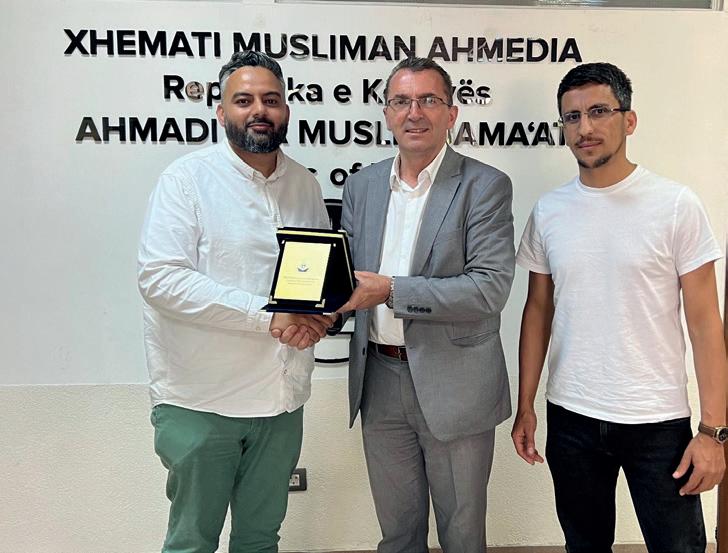
to all our readers!
EID MUBARAK ������
endeavours within Kosovo.



Humanity First Germany, in April 2020, had distributed essential hygiene supplies to the Kosovo Police Union. In expressing his heartfelt gratitude, Lieutenant Zeqiri conveyed that the aid received, comprising masks, gloves, and disinfectants at that time, far exceeded the estimated value of one million euros in today’s market.


Jalsa Yaum-eKhilafat held in Brampton, Canada
Syed Mukarram Nazeer Canada Correspondent
Jamaat-e-Ahmadiyya Canada held Yaum-eKhilafat jalsas across the country. One such jalsa was held by Brampton East Imarat on 28 May 2023, reported Khalid Hassan Sahib, Secretary Tarbiyat Brampton East Imarat.
A flyer with the details of the jalsa was prepared and shared with members of the Jamaat. Various meetings were held to organise the event and ensure members’ attendance. The event started with the recitation from the Holy Quran with its Urdu and English translations, followed by an Urdu poem with an English translation.

The first speech was delivered by the local
president of Castlemore Jamaat, Munawar Iqbal Majoka Sahib, on the “Blessing of Khilafat.” Next, a video documentary prepared by MTA International on “Ahmadiyyat in Africa” was shown.
A missionary, Asfand Suleman Sahib, delivered the next speech on the “Importance of Khilafat.” This was followed by faith-inspiring incidents of members of the Jamaat with Hazrat Khalifatul Masih Vaa, read by Sajid Ahmed Waraich Sahib from the personal diary of Abid Khan Sahib.
The concluding address was on “The spread of Ahmadiyyat in the world is a sheer blessing of Allah the Almighty.”
After the jalsa, dinner was served to all. The total attendance was 645.
Friday 30 June 2023 | AL HAKAM 16
Photo courtesy AMJ Kosovo
��
Friday Sermon
Baitul Futuh Mosque, Morden, UK
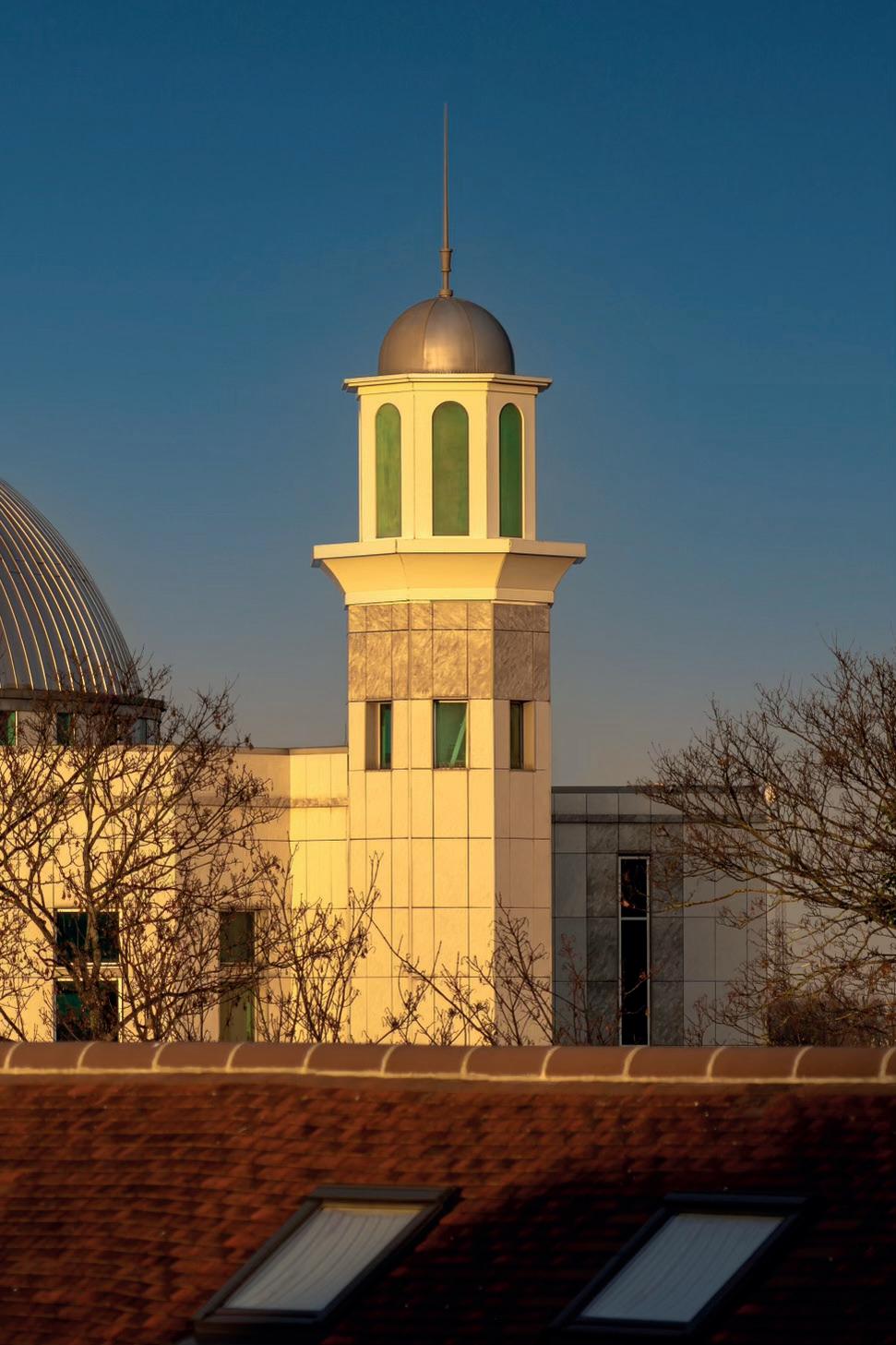
2 June 2023
Muhammadsa: The great exemplar
After reciting the tashahhud, ta‘awwuz and Surah al-Fatihah, Hazrat Khalifatul Masih Vaa stated:
I have mentioned various aspects of the lives of the companions, may Allah be pleased with them, who participated in the Battle of Badr and their sacrifices in a series of sermons. Many people expressed the desire and wrote to me that if the life of the Holy Prophetsa was not mentioned, it would remain incomplete, because the Holy Prophetsa was the real focal point around whom the companions gathered. Remaining attached to him, they attained unparalleled levels of offering sacrifices and learned new ways [of living]. Furthermore, they established such standards of spreading the unity of God and becoming personal embodiments of this, which bore testimony to the spiritual influence of the Holy Prophetsa and to his being dearly beloved by Allah the Almighty. Therefore, it is essential to also mention the life of the Holy Prophetsa Sermons on various aspects of the life of the Holy Prophetsa have already been delivered on various occasions over the previous years. Nevertheless, the life of the Holy Prophetsa is such that it cannot be confined [to one sermon]. Each aspect of his life is such that it cannot be covered even over several sermons. The life of the Holy Prophetsa will, God willing, be presented from time to time. As a matter of fact, one aspect or another is mentioned in some shape or form in every sermon or address. The reason for this is that this is the very central point of our lives and without it, our religion and our faith cannot be complete, and we cannot act in accordance with the Law that Allah the Almighty has revealed. In any case, I will now present some aspects of the life of the Holy Prophetsa and the historical accounts in relation to the Battle of Badr and this will continue over the next several sermons. It is the very example of the Holy Prophetsa that endowed the companions with a selfless spirit of sacrifice
and by doing so, it entered them into the fold of those who fought in the way of Allah, martyrs, the beloved of Allah the Almighty and those with whom He was pleased. We have witnessed these examples in our lives. Thus, it is important to mention the example of the Holy Prophetsa in relation to this battle as well.
Prior to mentioning incidents related to the battle [of Badr], it is also important to mention its causes and why it was fought. Therefore, I will first mention a brief background. Even in this background, the life of the Holy Prophetsa and the beautiful teaching he brought come to light. Mentioning the causes of the Battle of Badr, Hazrat Mirza Bashir Ahmad Sahibra has written in Sirat Khatamun-Nabiyyin [The Life and Character of the Seal of Prophetssa]:
“In the Meccan life of the Holy Prophetsa, the cruelties which were inflicted upon the Muslims by the Quraish and the schemes they employed in order to expunge Islam, were enough reason for war to break out between any two nations, in every era, and in all types of circumstances. History substantiates that in addition to extremely degrading mockery, and exceedingly offensive taunt and slander, the disbelievers of Mecca forcefully stopped the Muslims from worshipping the One God and announcing His Unity. They were very brutally beaten and battered mercilessly; their wealth was usurped unlawfully; they were boycotted in an attempt to kill and ruin them, while some were martyred ruthlessly and their women were dishonoured. This was to the extent that, disturbed by these cruelties, many Muslims left Mecca and migrated to Abyssinia. However, the Quraish did not rest at this either and sent a delegation to the Royal Court of the Negus in an attempt that these Muhajirun would somehow return to Mecca and the Quraish
would become successful in reverting them from their faith, or eliminating them.
“Then, great pains were inflicted upon the Master and Leader of the Muslims, who was dearer to them than their own souls, and he
was subjected to all kinds of suffering. Upon professing the name of God, the friends and comrades of the Quraish bombarded the Holy Prophetsa with stones in Ta’if, to the extent that his body became drenched in
17 AL HAKAM | Friday 30 June 2023
Photo courtesy of Suhaib Ahmad
blood. Ultimately, with the agreement of all the representatives of the various tribes of the Quraish, it was decided in the National Parliament of Mecca that Muhammadsa, the Messenger of Allah, be assassinated so that all traces of Islam may be wiped out, and Divine Unity may be brought to an end. Then, in order to practically implement this bloody resolution, the youth of Mecca, who were from the various tribes of the Quraish, assembled a group and attacked the home of the Holy Prophetsa by night. However, God protected the Holy Prophetsa, and he departed from his home – leaving them in the dust – and he took refuge in the cave of Thaur.
“Were these cruelties and bloody resolutions not then equivalent to an announcement of war by the Quraish? Against the backdrop of these incidents, can any sensible individual assert that the Quraish of Mecca were not at war with Islam and the Muslims? Then could these cruelties of the Quraish not become sufficient grounds to warrant a defensive war by the Muslims? In such circumstances, could any honourable nation of the world, which has not resigned itself to suicide, stand back from the acceptance of such an ultimatum as was given to the Muslims by the Quraish? Most definitely, if there had been another nation in place of the Muslims, they would have entered the field of battle against the Quraish much earlier. The Muslims, however, were ordered to exhibit patience and forgiveness by their Master. As such, it is written that when the persecution of the Quraish intensified, ‘Abdur-Rahmanra bin ‘Auf, and other companions, presented themselves before the Holy Prophetsa, and sought permission to fight the Quraish, but the Holy Prophetsa responded:
“‘For now, I have been ordered to pardon. Thus, I cannot give you permission to fight.’
“As such, the Companions bore every pain and insult in the way of religion, but did not let go of the handle of patience. When the goblet of the persecution of the Quraish had been satiated and began to overflow; and the God of this universe found the divine message to have been conveyed incontrovertibly, it was only then that God
ordered His servant to leave the city. For now, the matter had exceeded the limit of forgiveness, and the time had come when the perpetrators would reach their evil end. Hence, this migration of the Holy Prophetsa was a sign of the acceptance of the ultimatum of the Quraish. It was a subtle indication by God of the announcement of war; both the Muslims and the disbelievers understood this. As such, during the consultation at Darun-Nadwah (the place of consultation for the Quraish close to the Ka’bah), when an individual proposed that the Holy Prophetsa should be exiled from Mecca, the chieftains of the Quraish rejected this proposal on the basis that if Muhammad[sa] was to leave Mecca, the Muslims would definitely accept their ultimatum and enter the field of battle in opposition to them.
“Upon the occasion of the second bai‘at at ‘Aqabah, when the question of the migration of the Holy Prophetsa arose before the Ansar of Medina, they immediately said, ‘This entails that we should become prepared for war against the whole of Arabia.’ When the Holy Prophetsa left Mecca, he cast a sorrowstricken glance upon the boundaries of Mecca and said, ‘O Mecca! You were more beloved to me than all other cities, but your people have not allowed me to live here.’ Upon this, Hazrat Abu Bakrra said, ‘They have exiled the Messengersa of God. Now they shall indeed be destroyed.’

“In summary, until the Holy Prophetsa resided in Mecca, he endured all kinds of torment, but did not take up the sword against the Quraish. The reason being that firstly, before any measures could be taken against the Quraish, according to the custom of Allah, the divine message needed to be conveyed incontrovertibly, and this called for respite. Secondly, it was also the desire of God that the Muslims exhibit a model of forgiveness and patience to that final limit whereafter remaining silent was equivalent to suicide, which cannot be deemed a commendable deed by any sensible individual. Thirdly, the Quraish headed a kind of democratic government in Mecca and the Holy Prophetsa was one of its citizens. Hence, good citizenship demanded that until the Holy Prophetsa remained in Mecca, he respect the authority, and not allow anything that would disturb the peace,
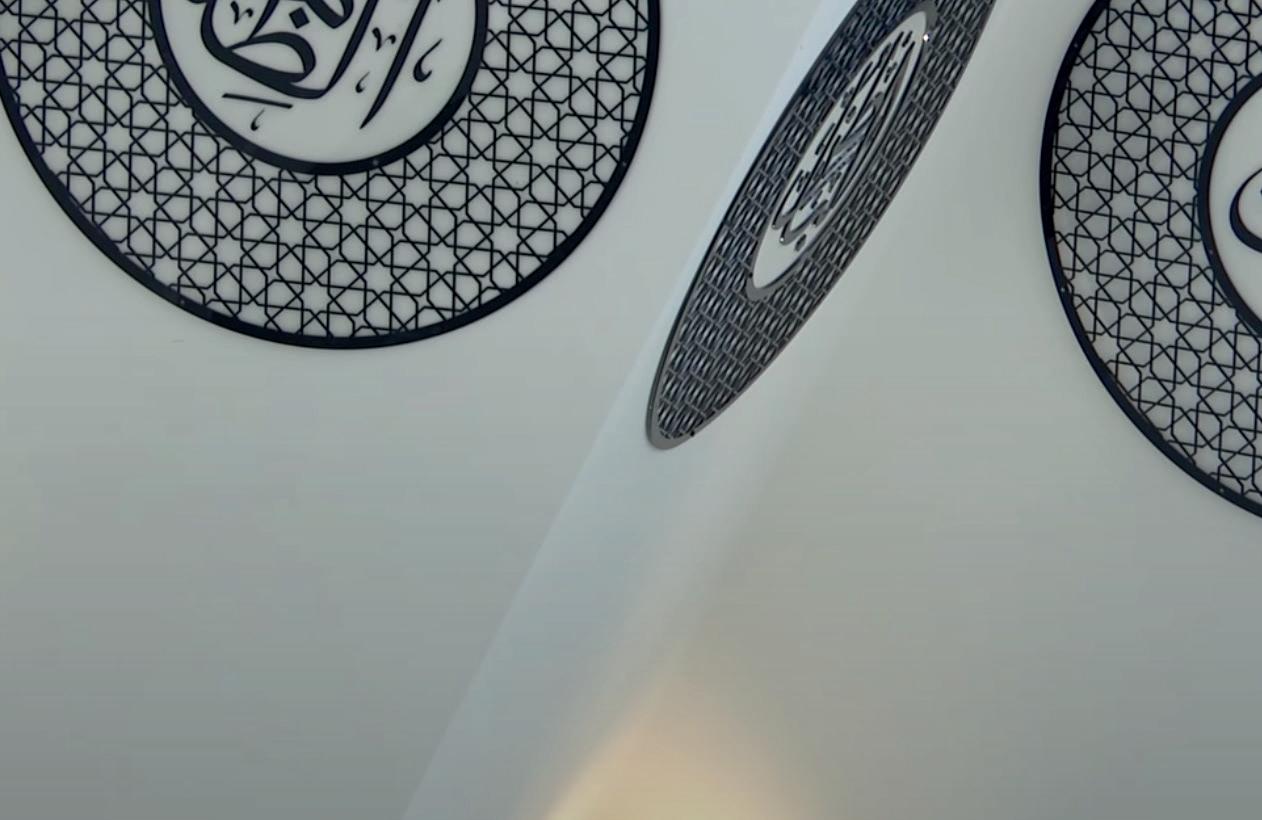
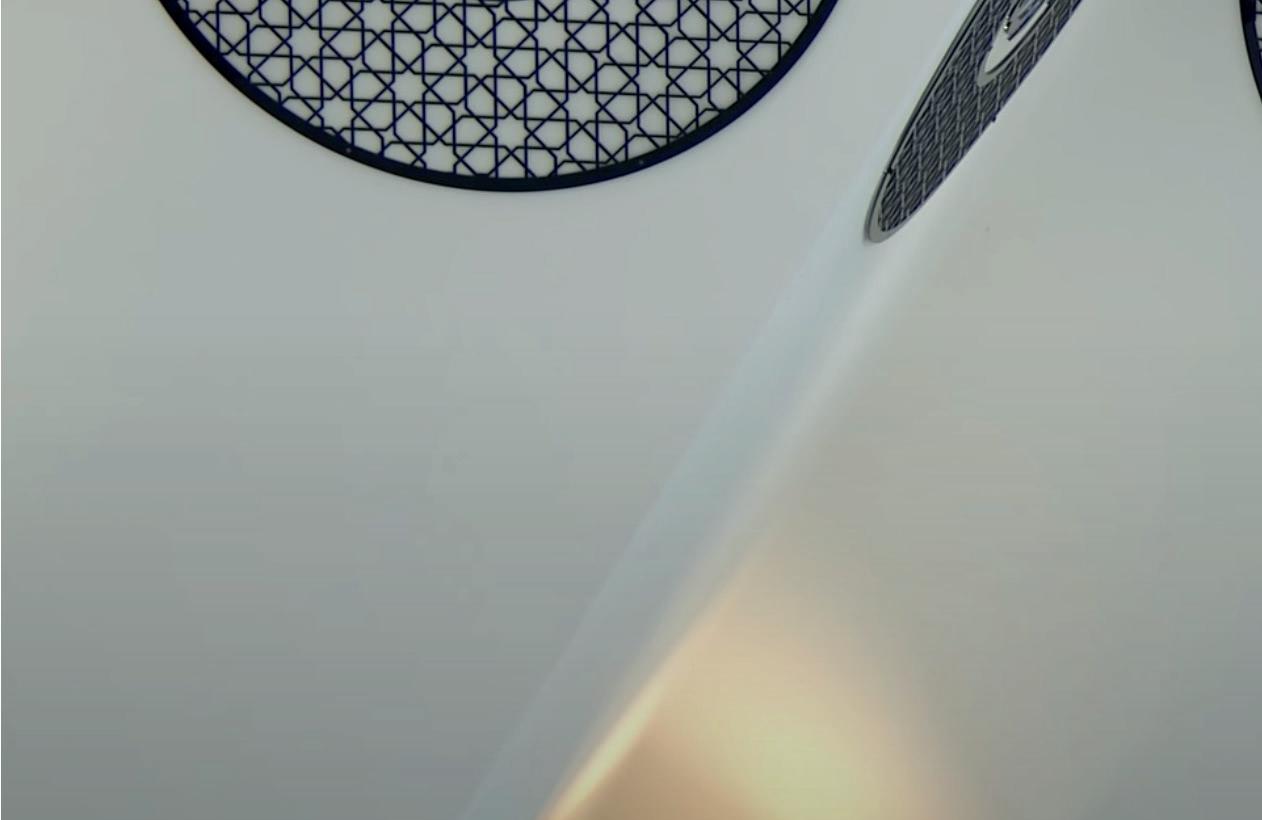
and when the issue exceeds the limit of forgiveness, he migrate from there.
“Fourthly, it was also necessary that until his people had become deserving of punishment due to their actions in the estimation of God, and until the time to destroy them had not arrived, the Holy Prophetsa live among them, and when the time arrives, he migrate from there. The reason being that, according to the custom of Allah, until a Prophet of God remains within his people, they are not struck by a punishment as would destroy them.
“When a destructive punishment is impending, the Prophet is ordered to leave such a place. Due to these reasons, the migration of the Holy Prophetsa possessed distinct indications within it, but it is unfortunate that these wrong-doing people did not recognise them, and continued to grow in their tyranny and oppression. For if the Quraish had abstained even now, and had refrained from employing a course of compulsion in religion, and had permitted the Muslims to live a life of peace, then God is the Most Merciful of those who are Merciful, and His Messengersa was also rahmatullil-‘alamin. Indeed, even then they would have been forgiven (and the Arabs would not have had to witness the carnage and bloodshed). However, the writings of divine decree were to be fulfilled. The migration of the Holy Prophetsa served as fuel for the fire of the Quraish’s enmity and they stood up with even greater zeal and uproar than before, to obliterate Islam.
“In addition to inflicting persecution and tyranny upon the poor and weak Muslims, who until now were still in Mecca, the first undertaking of the Quraish, as soon as they found out that the Holy Prophetsa had left Mecca, was that they set out to pursue him. They scanned every inch of the Valley of Mecca, in search of the Holy Prophetsa and even reached the mouth of the cave of Thaur. However, Allah the Exalted aided the Holy Prophetsa and placed such a veil upon the eyes of the Quraish, that after having reached the very place of destination, they returned frustrated and unsuccessful. When they became disappointed in this search, they made a public announcement that any individual who brought Muhammad[a] back – dead or alive – would receive a bounty
of a hundred camels, which is equivalent to approximately 20,000 Rupees in today’s currency. (This was in 1931, when Hazrat Mirza Bashir Ahmad Sahibra wrote this. Nowadays, it would amount to tens of millions.) Many young men from the various tribes of the Quraish set out in all directions to search for the Holy Prophetsa, in greed of the bounty. As such, the pursuit of Suraqah bin Malik […] was also a result of this announcement of reward. However, the Quraish were made to confront failure in this scheme as well.
“If one contemplates, for war to break out between two nations, even this sole reason is enough, in that a bounty of this nature is set for the Master and Leader of the other. (The Life and Character of the Seal of Prophetssa [Sirat Khatamun-Nabiyyin], Vol. 2, pp. 54-57)
[He further writes:]
“The Quraish found out that the Holy Prophetsa had reached Medina safe and sound…the chieftains of the Quraish sent a terribly threatening letter to the head chieftain of Medina, ‘Abdullah bin Ubayy bin Sulul, and his companions:
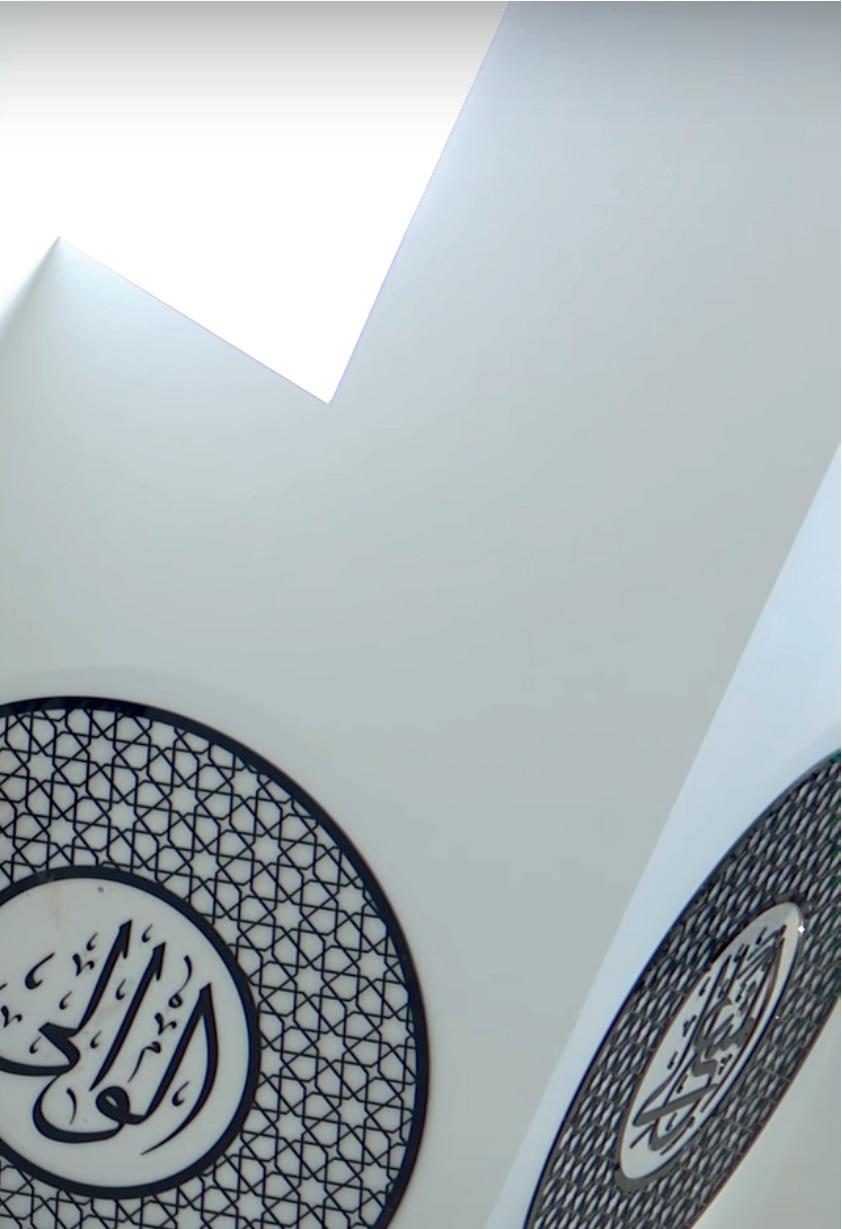
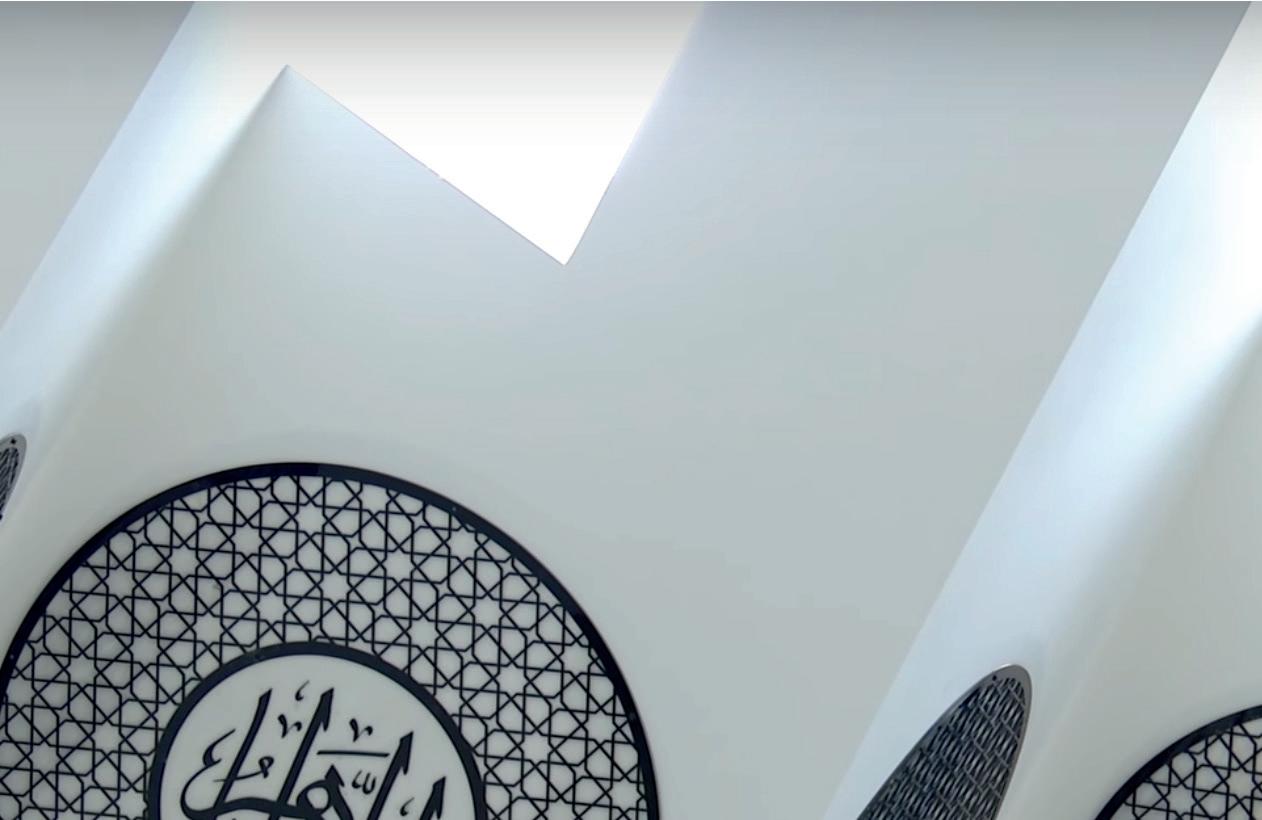
“‘You have given protection to an individual of ours (i.e., Muhammadsa), and we swear in the name of Allah that you shall either leave him and declare war against him, or in the least, exile him from your city. If not, we shall most definitely gather our entire army and attack you; and we shall kill your men and take your women into our own possession, making them lawful unto ourselves.’”
When Abdullah bin Ubayy bin Sulul and his polytheist companions received this letter, they gathered to wage war against the Holy Prophetsa. When the Holy Prophetsa learnt of this, he went to him and said, “You may consider the threat given to you by the Quraish to be very significant, however, they cannot harm you more than you will harm yourself. You desire to fight your own sons and brothers?” When the Jews heard this – many of whom had become Muslims – from the Holy Prophetsa, they scattered and abandoned him. Likewise, the Quraish of Mecca began visiting the Arab tribes to incite them against the Muslims. In this regard, Hazrat Mirza Bashir Ahmad Sahibra writes in Sirat Khatamun-Nabiyyin:
“When the Quraish noticed that the Aus and Khazraj refused to give up their protection of the Holy Prophetsa, and it was apprehended that Islam may take root in Medina, they toured the other tribes of Arabia and began to incite them against the Muslims. Since the Quraish enjoyed a distinct influence upon the other tribes of Arabia, due to their guardianship of the Ka‘bah, for this reason, upon the instigation of the Quraish, many tribes had become deadly enemies of the Muslims. The state of Medina was as if it had become surrounded by a raging fire.” (The Life and Character of the Seal of Prophetssa [Sirat KhatamunNabiyyin], Vol. 2, pp. 57-58)
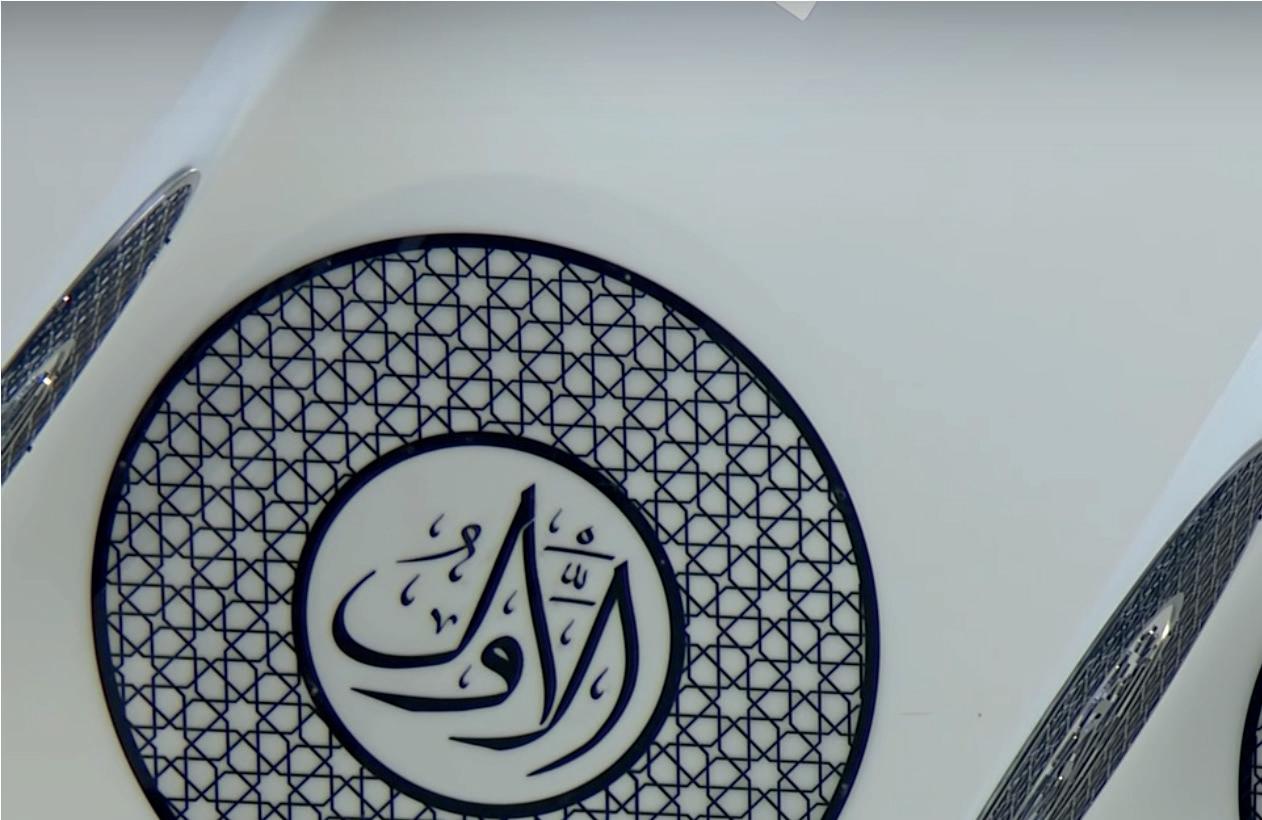
[He further writes:]
“As such, the following narration has already been mentioned:
“‘Ubayy bin Ka‘bra who was from among the distinguished Companions, narrates, ‘When the Holy Prophetsa and his Companions migrated to Medina, and the Ansar gave protection to them, in turn all of Arabia, collectively stood up against the Muslims. In that era, the Muslims would not
Friday 30 June 2023 | AL HAKAM 18
اولتاق� الف وفعلاب ترمأ ي إ
even put off their arms at night and during the day they would walk around armed in case of a sudden attack. They would say to each other, ‘Let us see if we live till such a time when we might be able to sleep in peace at night without any fear except the fear of God.’’ (Al-Mustadrak Al’a Al-Sahihain, Kitab-ul-Tafsir, Hadith no. 3512)
“The state of the Chief of Mankind himself was that (Hazrat A’ishara narrates):
“‘In the beginning, when the Holy Prophetsa arrived in Medina, he would often remain awake during the night in apprehension of an enemy attack.’ (Sunan Al-Kubra Li Al-Nisai, Kitab Al-Munaqib, Hadith no. 8617)
“With regards to the very same era, the Holy Quran states:
This date of this verse is in accordance with the research carried out by Hazrat Mirza Bashir Ahmad Sahibra, because it is recorded in relation to this verse that some portions of it were revealed in Mecca, whilst others in Medina. In any case, there are differing narrations with regard to the revelation of this verse. (Tafsir al-Qurtabi, p. 2110)
remain informed of the movements of the Quraish and their allies; and the Quraish also understood that the Muslims were not oblivious, so that in this manner, Medina could be safeguarded from the dangers of sudden attacks.
“‘O ye Muslims! And remember the time when you were few and were considered to be weak in the land, and were in constant fear lest people should snatch you away and destroy you. But God sheltered you and granted you support with His Succour and opened the doors of pure provisions upon you. Therefore, you should now live as thankful servants.’ [Surah al-Anfal, Ch.8: V.27]
“These were the external threats as mentioned in the Holy Quran. Even the internal state of affairs in Medina was not very favourable, (just as Hazrat Mirza Bashir Ahmadra writes:)
“Even in Medina, the state was that until now, a substantial segment from among the Aus and Khazraj stood firm upon polytheism. Although they were apparently with their brethren and kindred, in such circumstances, how could a polytheist be trusted? Secondly, there were the hypocrites, who at the outset had accepted Islam, but in secret, they were enemies of Islam, and their presence in Medina posed threatening possibilities. Thirdly, there were the Jews, with whom although there was a treaty, to these Jews the value of this treaty was nothing. Hence, in this manner, there were such elements present even in Medina itself, which were no less than a store of hidden ammunition against the Muslims. A tiny spark by the Arabian tribes was enough to set this ammunition on fire, and destroy the Muslims of Medina with a single blast. At this vulnerable time, which was such that a more critical time had never dawned upon the Muslims before, divine revelation was sent to the Holy Prophetsa, that now he should also take up the sword in opposition to these disbelievers, who had entered the field of battle against him, sword in hand, purely by way of injustice and tyranny. In this manner, Jihad by the sword was announced. (The Life and Character of the Seal of Prophetssa [Sirat KhatamunNabiyyin], Vol. 2, pp. 59-60)
[He further writes:]
“[…] The very first Quranic verse regarding Jihad by the sword was revealed to the Holy Prophetsa on 12 Safar 2 AH, or 15 August 623 AD, when a period of approximately one year had elapsed since the arrival of the Holy Prophetsa to Medina.”
(The Life and Character of the Seal of Prophetssa [Sirat Khatamun-Nabiyyin], Vol. 2, p. 61)
It is also recorded that this verse was revealed during the migration, as it was shortly after arriving in Medina that the Holy Prophetsa instructed to halt the caravans of the Quraish in the surrounding areas of Medina, and started sending armed parties for various defensive issues. As it were, whether this verse was revealed at the beginning of the migration, or perhaps a year later, it was the first time permission was granted to answer those who fought against religion, and it was only after the Holy Prophetsa had left from the government which he was previously subject to. As has been mentioned, no war could be waged whilst subject to the government, and his own government had already been established. This verse, or rather, two verses of Surah al-Hajj, in which Allah the Almighty granted permission are as follows:
“Thirdly: Another wisdom in dispatching these parties was so that the weak and poor Muslims of Mecca and its surrounding areas could find an opportunity by these means, to join the Muslims of Medina. Until now, there were many people in the region of Mecca who were Muslims at heart, but were unable to publicly profess their belief in Islam due to the cruelties of the Quraish. Furthermore, due to their poverty and weakness, they were unable to migrate either, because the Quraish would forcefully hold back such people from migrating […]
“Permission to fight is granted to the Muslims against whom the disbelievers have taken up the sword because they (i.e., the Muslims) have been wronged - And Allah indeed has power to help them –Those who have been driven out of their homes unjustly, only because they said, ‘Our Lord is Allah’ – And if Allah the Exalted did not repel some men by means of others (by granting permission for defensive war), there would surely have been pulled down cloisters belonging to monks and Christian churches and Jewish synagogues and mosques, wherein the name of God is oft-commemorated. And Allah the Exalted will surely help one who helps Him. Undoubtedly, Allah the Exalted is Powerful, Mighty.” [Surah al-Hajj, Ch.22: V.40-41]
That is to say, all religions have been protected here, as the names of all the places of worship are mentioned. After Jihad was made incumbent, the Holy Prophetsa initially employed four strategies to safeguard the Muslims from the harm of the disbelievers. In this regard, Hazrat Mirza Bashir Ahmad Sahibra has mentioned these four strategies, as he states:
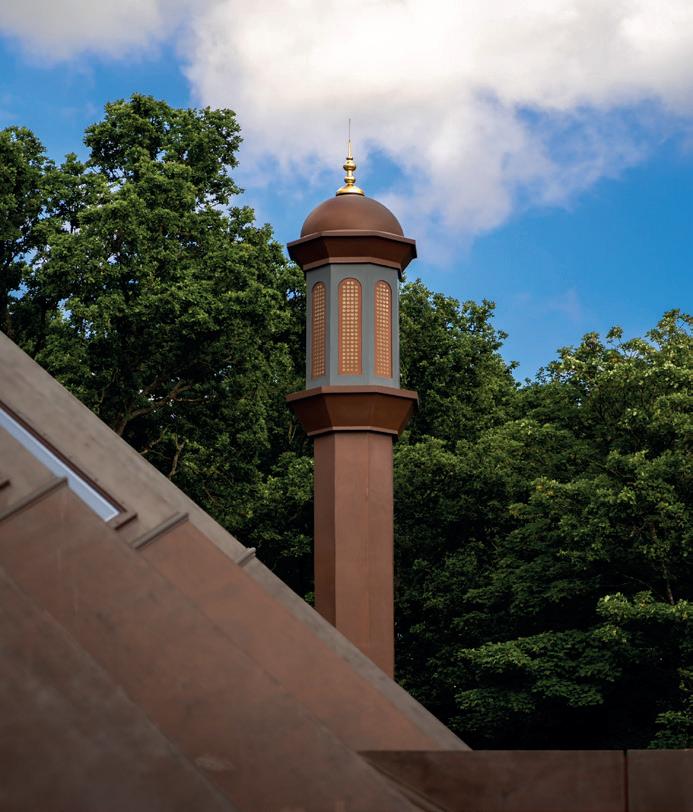
“Firstly: The Holy Prophetsa began travelling to nearby tribes and establishing peace treaties with them, so that the surrounding region of Medina would become free of threat. In this respect, the Holy Prophetsa gave special consideration to those tribes that were situated close to the Syrian trade route of the Quraish. As every individual may gather, it was these tribes in particular, from whom the Quraish of Mecca could have derived the most benefit against the Muslims and whose enmity could have resulted in severe threats for the Muslims.
“Secondly: The Holy Prophetsa began to dispatch small companies in order to obtain intelligence in different directions from Medina, so that he was able to
“Fourthly: The fourth strategy employed by the Holy Prophetsa was that he began to intercept the trade caravans of the Quraish which travelled from Mecca to Syria, passing by Medina en route. The reason being that, firstly, these caravans would spark a fire of enmity against the Muslims wherever they travelled. It is obvious that for a seed of enmity to be sown in the environs of Medina, was extremely dangerous for the Muslims. Secondly, these caravans would always be armed and everyone can appreciate that for such caravans to pass by so close to Medina was not empty of danger. Thirdly, the livelihood of the Quraish primarily depended on trade. Therefore, in these circumstances, the most definitive and effective means by which the Quraish could be subdued, their cruelties could be put to an end and they could be pressed to reconciliation, was by obstructing their trade route. As such, history testifies to the fact that among the factors which ultimately compelled the Quraish to incline towards reconciliation, the interception of these trade caravans played an extremely pivotal role. Hence, this was an extremely sagacious strategy, which yielded fruits of success at the appropriate time. Fourthly, the revenue from these caravans of the Quraish was mostly spent on efforts to eliminate Islam. Rather, some caravans were even sent for the sole purpose that their entire profit may be utilised against the Muslims. (The trade that took place in opposition to Islam was for the sake of waging war against the Muslims.) In this case, every individual can understand that the interception of these caravans, was in its own right, an absolutely legitimate motive.” (The Life and Character of the Seal of Prophetssa [Sirat KhatamunNabiyyin], Vol. 2, pp. 89-92)
This series will continue in the future, God-willing. At this time, I wish to make mention of some deceased members whose funeral prayers will be offered. One of the funerals will be held in praesentia, which is of respected Khawaja Muniruddin Qamar Sahib, while the others will be held in absentia. Khawaja Muniruddin Qamar Sahib lived here in the UK. On 27 May [2023], by divine decree, he passed away at the age of 86.
father, Maulana Qamaruddin Sahib, when he was very young, as an infant. Maulvi Qamaruddin Sahib, the father of the deceased, was the first central President of Majlis Khuddam-ul-Ahmadiyya. When the partition of India and Pakistan happened, his family moved to Pakistan. Khawaja Muniruddin Sahib lived in Tanzania, Africa, for some time. He also had the opportunity to serve the Community in various capacities in Rabwah. Then, in 1966, he and his family moved to the UK, where they lived close to the Fazl Mosque. They’ve been here for a very long time, so everyone is acquainted with them. During the time of Hazrat Khalifatul Masih IVrh, he had the opportunity for a long time to call the Adhan [call to prayer] at the Fazl Mosque for Friday prayers. He also had the opportunity to serve as the Local President of Fazl Mosque and Putney. After retiring in 1995, he dedicated his life and he had been voluntarily serving, first in Wakalat-e-Tabshir and then in the Office of the Private Secretary here in the UK. Even the day before his demise, he was working in the office until the Zuhr prayer after which he returned home. He was regular in offering the five daily prayers, quiet in nature, compassionate, sociable, virtuous, sincere, and loyal. He was a musi He is survived by his wife, two sons and two daughters, along with many grandchildren. He was also the maternal uncle of Amir Sahib UK. May Allah the Almighty grant him forgiveness and mercy and elevate his station. This funeral will be offered here in praesentia, God-willing.
The others will be funeral prayers in absentia. The first among them is that of Dr Mirza Mubashar Ahmad Sahib, who was the paternal grandson of Hazrat Muslehe-Maudra and the son of Mirza Munawwar Ahmad Sahib and Mahmooda Begum Sahiba. He was the maternal grandson of Hazrat Nawab Mubaraka Begum Sahibara He recently passed away at the age of 79.
نوعجر ہيلا اناو هلل انا
[Surely, to Allah we belong and to Him shall we return.]
He was a musi by the grace of Allah the Almighty. His primary education took place in Lahore. He then attended King Edward Medical College in Lahore, where he obtained his MBBS. He then worked for some time at a hospital in Rabwah. Then he came here to the UK for studies and did his postgraduate and FRCS in 1970 at the Royal College of Surgeons in Edinburgh. Since he had dedicated his life, he returned [to Rabwah] and served in the Fazl-e-Umar Hospital, where he was able to serve for
نوعجر
هلل انا [Surely, to Allah we belong and to Him shall we return.]
He was the maternal grandson of Hazrat Mian Khairuddin Sekhwani Sahibra, a Companion of the Promised Messiahas
The Promised Messiahas also saw his
19 AL HAKAM | Friday 30 June 2023
Photo courtesy of Suhaib Ahmad
نا نوفاخت ضرالا ىف نوفعضتسم ليلق متنا ذا اوركذاو تبيطلا نم مکقزرو ہرصنب مکدياو مکواف سانلا مکفطختي نورکشتمکلعل
ريدقل مهرصن ىلع هللا ناو ؕ اوملظ مهناب نولتقي نيذلِل نذا ؕ هللا انبر اولوقي نا الا قح ریغب مهرايد نم اوجرخا نيذلاۣ ۔ و عيبو عماوص تمدهل ضعبب مهضعب سانلا هللا عفد الولو نم هللا نرصنيلوؕاریثک هللا مسا اهيف ركذي دجسمو تولص زيزع یوقل هللا نا ہرصني
ہيلا اناو
about 50 years. Of the doctors who are life devotees and have worked there under the Nusrat Jehan scheme, he served the longest, or it is possible that Dr Mirza Munawwar Ahmad Sahib served longer. In any case, he had the opportunity to serve for 50 years. In 1983, Hazrat Khalifatul Masih IVrh appointed him as a member of the Waqf-eJadid Board, and he remained a member of this board until his demise.
His wife writes, “He honoured his relations and took care of his relatives, whether parents, siblings, relatives, my parents and relatives, indeed everyone. I cannot recall any occasion of happiness or sadness on which he did not take responsibility upon himself. He never slackened in honouring his relations. He also had the opportunity to treat the elders in the family. He would visit the homes of the ill to enquire about their well-being.
Similarly, he would help those in need in any way that he could and he never turned away someone who was in need. He facilitated the education of many girls and would even take the entire financial burden of their weddings upon himself.”
Some girls have written to me about this. Some of them even lived in his home and he raised them like his own daughters and then had them married. Many people have written to me saying that he would even waive the fees of some patients, in fact, he would give them medicines and even some money. He had a deep connection with the Khulafa. He was connected to them in that he was related to all the Khulafa during his time, but he also had a profound connection of respect and honour for them. Not only did he instil this in his children, but he also exhibited his own example in doing so.
He was quite older than me, by about six or seven years, but after I became Khalifa, he treated me with great respect and honour. In fact, even before this, when I was Nazir-e-A’la, he showed me great respect and honour at that time as well. His wife writes that during the final illness of Hazrat Khalifatul Masih IV’srh wife, Huzoorrh called and asked for Dr Mubashar to come immediately. Hence, they say that upon receiving this message, he left that very night and remained there until her demise. Upon the demise of respected Hazrat Asifa Begum Sahiba, Hazrat Khalifatul Masih IVrh said, “Mubashar came near the lift to get me
and as soon as I saw him, I understood that my wife had passed away because I knew that if she was unwell, Mubashar would have never left her side.” During Hazrat Khalifatul Masih IV’srh own illness, he would often travel to the UK for his treatment. Hazrat Khalifatul Masih IVrh also mentioned his services during his illness in one instance.
His wife writes, “Once, a false complaint was made against him, and a committee was formed in order to investigate it. At that time as well, he respected the Khalifah of the time and administration and never said or did anything unbecoming. The committee conducted its investigation and determined that he was free from any fault.”
His son writes that some opponents from Chiniot and some surrounding areas would come to his home for treatment. In fact, he had many non-Ahmadi patients; I am aware of this as well. He treated countless people in the area, due to which many people became acquainted with Rabwah and the hospital in the area.
During his final illness, the Promised Messiahas used a certain spoon to take his medicines; it was a small spoon that Hazrat Amma Janra gave to Hazrat Umm-e-Nasir, saying that it should be given to whichever one of her sons became a doctor. The spoon was given to his father, Mirza Munawwar Ahmad Sahib, after which the spoon was given to him. Sometimes, for the sake of blessings, Dr Mubashar Sahib would use that spoon to give medicine to his patients.
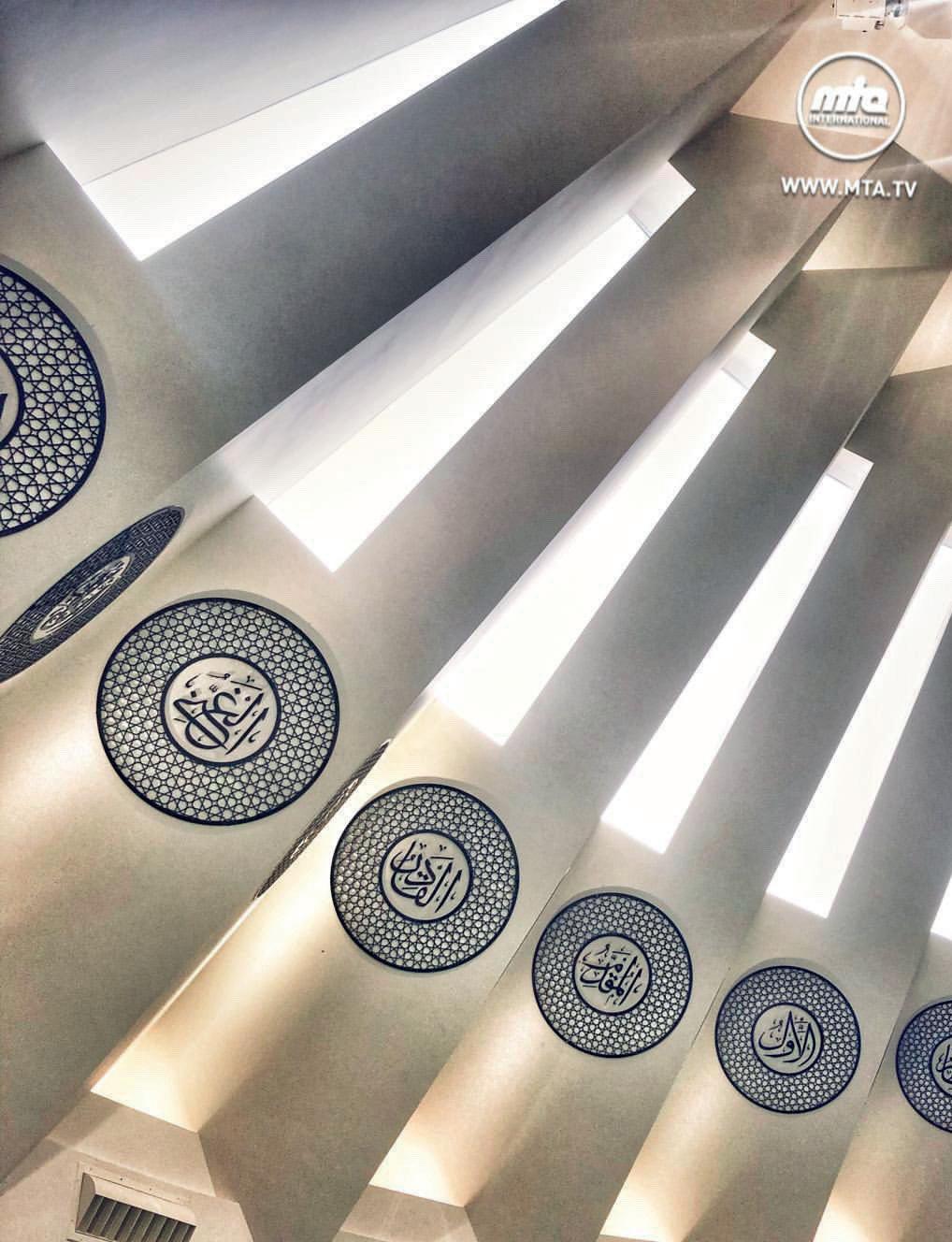
People from all walks of life came to offer their condolences, however, a vast majority were of the less fortunate, who constantly expressed that they were indebted to Mian Sahib. Some of them were those whom he had treated, and others he had looked after in a different way. There were many landowners who brought their wives or sisters to him for treatment, and those landowners came and expressed how he had taken care of them. Everyone, even nonAhmadis came and cried, saying that they had lost a father.
Many of the staff members of our hospital have written to me saying that their hospital is now orphaned and expressed their deep regret. Nonetheless, he upheld his relationship with everyone and looked after the poor. The Holy Prophetsa once stated that if a person is praised upon his funeral procession, paradise is made certain for him. (Sahih al-Bukhari, Kitab-ul-janaiz, Hadith 137)
May Allah the Almighty fulfil these words in his favour as well.
Dr Mirza Sultan Ahmad Sahib says, “According to my knowledge, in the entire Community, he has the honour of being the doctor who has rendered the longest service.” Just as I mentioned earlier. He further writes, “There were no assistants or helpers during the era in which he began working. He had to close up, open up, call in his patients and perform other tasks all on his own. He also had to solely manage the operating theatre. There was no anaesthetist, and so he also had to look after that task himself. Then, he gradually trained his staff, after which the hospital became popular.” He also writes, “The ratio for infections was also lower than other private hospitals.
Most patients were discharged from the hospital after being treated successfully.” Nevertheless, he has also observed his kind treatment towards patients, even if they be non-Ahmadis. I am also personally aware that he was a very respectful person.
Dr Munir Mubashir Sahib works at a government hospital. He writes, “I have witnessed the long and vast course of service offered by the respected doctor, not just for those residing in Rabwah but also in all the surrounding areas.” He further states, “I have worked entirely on the outskirts of Rabwah. (He has been posted in various small hospitals in Rabwah.) Many people from approximately all the surrounding villages were among his patients.” Owing to this, as I have stated, many non-Ahmadi people came to convey their condolences upon his demise.
Dr Noori Sahib writes, “An elderly man living alone in Rabwah had hung a picture of Dr Mubashar Sahib in his room. (Dr Noori Sahib went to visit this elderly man.) The patient spoke with great praise and admiration for Dr Mubashar Sahib, saying that he would often visit him to enquire about his health and well-being and offered prayers for his well-being.”
This incident took place while he was alive. There are so many letters mentioning his qualities, services and the sentiments of his patients that it is impossible for me to mention them all. As I mentioned earlier, he also had an extraordinary bond of loyalty with Khilafat. May Allah the Almighty show him unending mercy and forgiveness and grant him a station amongst his loved ones.
The third funeral prayer – and the second in absentia – is of respected Syedah Amatul Basit Sahib, wife of Syed Mahmud Ahmad Sahib of Islamabad. She passed away a few days prior.
[Surely, to Allah we belong and to Him shall we return.]
She was the granddaughter of Dr Syed Abdul Sattar Shah Sahib, and the daughter of respected Syed Abdul Razzaq Shah Sahib. She was also the niece of Hazrat Umme-Tahirra. Her father, Abdul Razzaq Shah Sahib, married the first Irish Ahmadi woman in 1945, Hanifah Shah Sahiba, whose name used to be Catherine O’Brien. This marriage took place in Nairobi, Kenya. Her mother then came to Pakistan while her father, Shah Sahib was posted in Sindh. There, she offered great sacrifices, despite being from Ireland. She lived in a small village while offering great sacrifices. Her children also offered great sacrifices, amongst whom is Amatul Basit Sahiba.
Her husband, Syed Mahmud Shah Sahib, states, “She was regular in offering her prayers, especially the Tahajjud [predawn voluntary prayer] prayers. Since her childhood, she offered the Tahajjud prayers alongside her father. She revered and observed religious practices. She always helped the poor and those in need. She adhered very strictly to the veil [purdah]. She was a musiah. She is survived by her husband, daughter and two sons. One of her sons, Syed Bashir Ahmad, resides here [in the UK], and her other son is Syed Shahid
Ahmad. Her daughter, Majidah Malik, lives in America. Her daughter, who is the wife of Dr Amir Malik Sahib of America states, “My mother was well-liked by others and possessed an outstanding personality. Everyone who met her was captivated by her. She loved Khilafat with all her heart, she had a refined personality, was wellmannered and possessed good morals. She never openly expressed her pain. She actively partook in helping the poor and almsgiving. She helped girls get married, gave rations to shelter homes for the poor, covered expenses for the education of orphans and fed the poor – ultimately, she spent her time helping the people of Allah the Almighty, whether it was through prayers or charity. She preferred to speak more about God and divine succour and befriended those who loved God as well. Allah the Almighty also manifested to her in a special manner; Allah the Almighty would accept her prayers. And Allah the Almighty would inform her about the acceptance of her prayers in many matters. She did not miss her prayers, even during severe sickness, and she was always watchful of the time lest she miss a prayer. May Allah the Almighty grant her forgiveness and mercy and elevate her station. May He enable her children to carry forward her virtues.
The third funeral prayer in absentia is of respected Sharif Ahmad Bandesha Sahib. He was the Sadr Jamaat of Chak 261 RB Udhowali, Faisalabad, Pakistan. He also passed away a few days ago.
[Surely, to Allah we belong and to Him shall we return.]
His son, Rahmatullah Bandesha Sahib, who is serving as a missionary, writes, “My grandfather was only two to three months old when his parents and close relatives passed away during the plague in the time of the Promised Messiahas. At that time, in his early days, my grandfather was raised by a family of distant relatives who were Ahmadis. After the decision of a judge in Batala, he was put in the care of another Ahmadi family, who were closer relatives to him. In this way, he was raised from the very start in an Ahmadi environment and remained a part of the Ahmadi Community. The deceased was Sadr in his village for nearly 25 years. He possessed many qualities and had a dervish character. His worship was of a lofty standard; he helped those in need, especially his family and friends; he had boundless love for the Jamaat and the institution of Khilafat.. He is survived by his five sons and three daughters. As I mentioned, one of his sons, Rahmatullah Bandesha Sahib, is a missionary and is currently serving as a teacher in Jamia Ahmadiyya Germany. Due to the opposition and dire circumstances in his village, he was not able to attend his father’s funeral and burial on time. May Allah the Almighty show forgiveness and mercy to the deceased and elevate his station. May He also enable his children to carry his virtues forward.
(Official Urdu transcript published in the Daily Al Fazl International, 23 June 2023, pp. 2-6. Translated by The Review of Religions.)
Friday 30 June 2023 | AL HAKAM 20
Editor-in-chief: Qaasid Muin Ahmad | Executive editors: Ataul Fatir Tahir, Aqeel Ahmed Kang | Research coordinator: Awwab Saad Hayat | Associate editors: Jalees Ahmad, Ata-ul-Haye Nasir Translations: M Adam Ahmad | Design: Tahmeed Ahmad | © Al Hakam 2023
نوعجر ہيلا اناو هلل انا
نوعجر ہيلا اناو هلل انا


























































